#is it so hard for them to translate approaching the original context
Text
River's Edge & The Flat Battle? Field: Deep Diving a Single Word
So the 1993 manga River's Edge, by Kyoko Okazaki, was finally officially released in English last week. It's a problematic fave of mine, and (as I discussed in my review of it many moons ago), the peak of its edgy angst is this poem, standing alone on a field of black, near the end of the book:
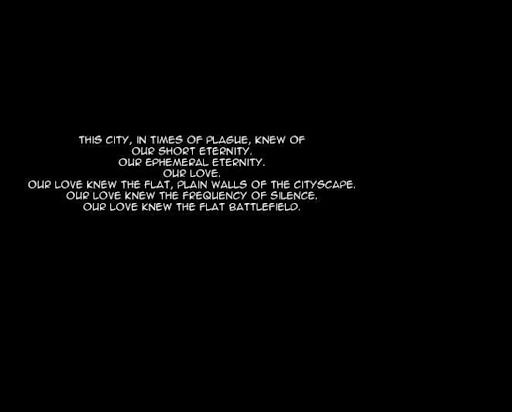
"The flat battlefield" is a phrase that has really stuck with me since I read it, and anything that has that level of sticking power is a meaningful piece of art. My opinion of the manga has grown over time.
So when I got to this section in the official translation and I saw:

I was a bit bummed, "flat field" really just lacks the impact "battlefield" ha-
-wait what?
Reprinted by Permission of SSL/Sterling Lord Literistic, Inc.
Copyright by William Gibson, originally published in "Robert Longo"
Okazaki didn't write this, William Gibson did?? The American cyberpunk fiction author? He...writes poetry? Turns out by the way this attribution is in the original manga, it just didn't survive the scanlation process.
I was curious about both how and when this translation shift occurred (if it ever did), and the origin of this poem - which was really hard to find! "Robert Longo" is not a book, he's a person - an American artist and filmmaker who directed the 1995 movie Johnny Mnemonic, which William Gibson wrote the screenplay for (and wrote the short story it is an adaptation of). When you search books by the two of them nothing really turns up - at least on the western side of things. In America they never really did publish a book. But in Japan they published a few actually - some too late for 1993's River's Edge, but in 1991:

Publisher Kyoto Shion's Art RANDOM series, vol. 71, featuring the collected art of Robert Longo, edited by Kyoichi Tsuzuki...and featuring inset poetry by William Gibson. Funnily enough one of the listings (Fukkan) actually notes:
現代美術コレクターだけでなく、ウィリアム・ギブスンのファン、岡崎京子のファン共々気になる作品集だと思います。
This is a work that will be of interest not only to contemporary art collectors, but also to fans of William Gibson and Kyoko Okazaki.
The poem from this book - which is called "The Beloved: Voices for Three Heads" - is way more famous as a reference by Okazaki than as a work by Gibson. Which turned out to be a problem when I wanted to dig deeper and find the actual poem and its context; when you google it you get...almost entirely Japanese results discussing River's Edge! Which means I couldn’t actually find the poem, just Japanese translations of it. And I am pretty sure the poem was not originally in Japanese - the bookseller listings note that the book is bilingual in both Japanese & English, the Gibson poems would be the obvious English candidates.
However, buried beneath piles of mid-2000’s Japanese Okazaki fandom blog posts, I found the work of academic Gary Westfahl. He wrote a deep dive book in 2013 on the works of William Gibson, and in the abstract header for Chapter Five:
It also considers Gibson's poems such as “The Beloved: Voices for Three Heads,” his ventures into writing song lyrics, and the approach he used in some of his later nonfiction works
Ba-bam - and with a quick trip to LibGen pulling up a pdf version of the book, here we go:
Gibson's first literary publications, in 1963, were poems, and he obviously remained interested in the form, since in the 1980s and 1990s, when artists approached him about collaborative projects, he usually provided poetry. To date, Gibson has published three poems, not counting fanzine efforts, along with two other poems available only as excerpts.
Asked to contribute to Robert Longo's 1989 performance piece Dream Jumbo, Gibson wrote a poem, "The Beloved: Voices for Three Heads," later included in a book, Robert Longo: Art Random, largely devoted to documenting that show
Gary fucking Westfahl, coming through in the clutch!! I was curious why this combination art book/poetry existed, but now it makes sense; the poem and the art were already a packaged deal as part of a performance art exhibit. And this also explains why the poem was so hard to find - as of 2013 Gibson only ever published 3 poems in his career! I am curious how this play got over to Japan - Dream Jumbo premiered in LA in 1989, but additionally in 1989 Longo had a titular "Robert Longo" art exhibit at the Seibu Contemporary Art Gallery in Tokyo, which had its own art book published - its fair to say he was "big in Japan" and so the success of Dream Jumbo made its way over. He would actually run a sort of gallery-version of the performance in Tokyo in 1995, for which he gave an interview that taught me that the name "dream jumbo" is pulled from the name of a popular Japanese lottery; perhaps it was always destined for Japan and also Robert Longo is a bit of a weeb.
ANYWAY the actual text of the poem:
Our love knew
The flat field
Yeah, it was originally ‘field’. Westfahl also confirms that this poem was only ever published in print in Japan, making it virtually unknown outside of it. Which, and this is kind of cool, means that the publishing of the translation of the Japanese manga River's Edge is the first time Gibson's "The Beloved: Voices for Three Heads" has ever been published in the West.
Knowing that the original is ‘field’, I checked the original Japanese page for River's Edge and:
戦場 - Battlefield
The first kanji is literally 'war', this is not ambiguous, there is no other read here. River's Edge changed the word from "field" to "battlefield" - assuming that the original art book did not have its own Japanese translation of the poem. On reflection, it probably did; it's not like Okazaki herself is a translator, and in the manga the poem’s translation is credited to translator Hisashi Kuromaru, who had previously translated Gibson’s novel Neuromancer. However, it’s not like I have a copy to check, so I can’t say for sure.
…or so I thought! But when looking around for Kuromaru’s translation credits, I stumbled on the most precious resource one can find; a blog post from an Okazaki-otaku a decade+ after the fact who was obsessed with the poem and hunted down a copy of the original Art RANDOM artbook to see it for themselves. In their post they give a line by line comparison of the poem and its translation…credited to Kuromaru, confirming that this book is where the translation comes from. And lo and behold:
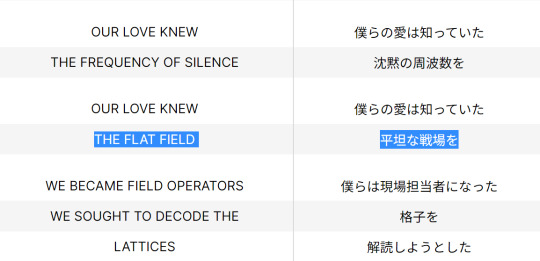
Kuromaru is the source of our creative twist. Chad of chads, “Tach” from 2005.
What is funny is that this is not like a tiny little quirk I am interested in - I mean, okay, it's mainly that. But "the battlefield" is actually a small part of Okazaki's brand as an artist. Here is a sketch she sold titled "Girl's Life on the Battlefield" (It uses the same kanji)
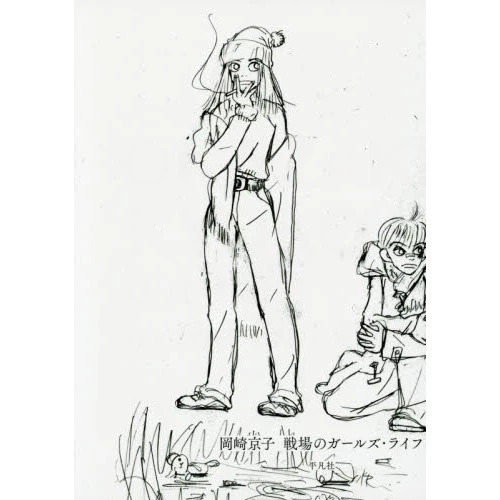
Here is a link to an exhibit of her work in Japan that was titled:

(Her art is incredibly on point btw).
Here is an entire book by art critic Noi Sawagari investigating How we survive on a flat battlefield - Kyoko Okazaki's theory! The one Amazon review says its content is "thin” and it was “tiring to read”, 2 stars, ouch.
But you get what I'm saying- Okazaki leaned into this phrase. I'm actually a little let down, when I read River’s Edge and was so taken with this specific moment I thought it was a ‘me’ thing; turns out the entire country of Japan was equally smitten and it became the tagline for the manga. Real loss of hipster points for me on this one! Still, I really think “battlefield” is way more impactful - this elevation of the phrase would not have happened if it was just ‘field’, I feel confident on that. And I am not calling the translation ‘wrong’, or anything. It is just one of those tiny contingencies, this liberal translation and odd series of events, art crossing from LA to Japan, led to a brand for an up-and-coming josei manga author that wouldn’t have been possible otherwise. And in fact, I am willing to say that the translation just published by Kodansha of River’s Edge is… not right. It doesn’t matter what Gibson wrote - this is Okazaki’s poem now. She wrote a manga about the battlefield, all of her fans agree, and a truly faithful translation would build on that.
So I’m sticking with “battlefield” and y’all should too.
52 notes
·
View notes
Text
ORPHEUS [3361] AND EURYDIKE [75] NOTES
This will go into natal and synastry positions, aspects, and overlays. I've been researching this pair for my own purposes, but it's worth sharing, I think. Disclaimer is in my blog bio.

💀 ORPHEUS [3361] and EURYDIKE [75] are both underutilized in chart readings, imo, especially as a pair (though I am extremely biased). The meaning and the mythology is strong, and prominence in the chart can be impactful to great effect, in any type of chart, but especially synastry.
💀 Remember, asteroids are never as powerful as planets or system angles, but prominent asteroids should be considered, especially if they do resonate with the native.
💀 Uses in chart: art, life/death/rebirth, love, stories, fame and reputation, beauty, nature, tragedy, destiny, loss.
💀 You'll find a summary of one of the most common iterations of the myth of Orpheus and Eurydike here and if you prefer referring to an original text, there's a translation of Ovid's version here - small details vary but this is the general gist if you need context.

Eurydike in the Chart
💀 Eurydike is the ‘tragic muse’ figure (in contrast to Galatea’s and Aphrodite’s ‘fortunate muse’).
💀 As an object, she generally correlates to disappearances, being out of reach, being abandoned, absences, misplaced trust, and an early departure.
💀 An individual with prominent Eurydike usually feels as though they are always being left behind, though they often are the first to create some distance, not always through fault of their own.
💀 Eurydike ASC aspects make the native appear elusive - and they often are. Others have a hard time pinning them down. They have a detachment to them that makes it feel wrong or improper to approach and interrupt them, as if just by talking to them you're treading in territory you're not supposed to be in.
💀 Eurydike MC will give the native a tragic reputation - they may be known for a near death experience. Or it may manifest in an individual who is constantly moving away, leaving behind friends and family. They may be spoken of more after they've already left, as someone that is missed, rather than when they're actually there.
💀 Eurydike MCs may also be well known for their relationships to artists, especially as muses and sources of inspiration, or if the relationship is malefic in some way.
💀 Eurydike ASCs, on the other hand, may not be known for it, but will enchant a great many people through even brief interactions. They often have a trail of creators in their wake who still call upon their memory for artistic inspiration.

Orpheus in the Chart
💀 Orpheus, in his own right, is the ‘tragic artist’ figure (in contrast to Apollo’s or Pygmalion’s ‘fortunate artist’).
💀 He correlates to grief, obviously, but also to devotion, fidelity, obsession, fear, doubt, an inability to let go of the past that hurts, an unwillingness to let go.
💀 An individual with prominent Orpheus feels like they are always undergoing a trial for the sake of love. Love is everything to them but it feels like the world is against them and their love, or that their love is fighting them. They can get stuck in unhappy relationships because of their tendency to just pour effort forth.
💀 Orpheus aspecting the ASC makes the native very comfortable in the realm of performance - it comes second nature. Orpheus aspecting the MC is capable of pulling out heartwrenching performances, and is known for such, but it isn't effortless.
💀 Orpheus ASC also know how to charm their way into places they aren't supposed to be, and are comfortable doing so at the drop of a hat. Orpheus MC carefully selects when to trespass, making moments memorable enough to define their image.

Orpheus and Eurydike in Tandem
💀 If Orpheus and Eurydike aspect one another in the natal chart, you may naturally be drawn to doomed relationships, or you may self sabotage in your doubt. There’s also a chance of romanticizing tragedy overmuch.
💀 You know how Eurydike is elusive and Orpheus transcends? This is why Orpheus placements are such a good match for them. Orpheus transcends in the name of love and creativity, which makes them the perfect candidate to recognize and reach out to Eurydike.
💀 Eurydike likewise is charmed and inspired by Orpheus, both for their transgressions and devotion. For an Orpheus native, who is prone to being taken advantage and/or runs the risk of intimidating others with their intensity, Eurydike's validation is a relief.
💀 However, this is why it's so devastating if something goes wrong. Eurydike disappears as a coping mechanism, Orpheus never lets go. It's a recipe for a painful cycle.
💀 Even if one or the other or both choose to make the break, Orpheus will be haunted by Eurydike, and what they could've done to fix the situation. Eurydike's life will lose color without Orpheus - the isolation can be stifling and overwhelming.

The Dark Side of Orpheus and Eurydike
💀 Eurydike invites fear, paranoia, deception, melodrama, flightiness, misunderstandings, and sabotage, especially self-sabotage.
💀 Eurydike is prone to disappearing without warning. This may be by choice, but it also may be due to reasons beyond their control.
💀 Orpheus invites grief, depression, wallowing, artistic obsession, and being "torn apart" by fans as Orpheus both incites the obsession of others and instills obsession in the native.
💀 The obsession of others over the native will be a more parasocial one - obsession with their work, reputation, artistry, their creative mind.
💀 The native's obsessions will be personal, intimate, likely romantic.
💀 Orpheus-Eurydike aspects in natal and sybaatry invite obsession, jealousy, paranoia, stalking, death, short marriages, separations, and any of the typical potential harm that comes of a muse-artist relationship.

Other Objects to Check Out
💀 It’s worth checking placements and aspects for Pluto, Hades, both Proserpina(s), Persephone, and Melpomene if Orpheus and Eurydike play big roles in your synastry chart.
💀 Also, if you have one or both asteroids prominent, lmk about these other objects - I have Proserpina [h57] loosely conjunct Lilith, Persephone [399] conjunct my moon, and Proserpina [7292] exactly conjunct my Pars Fortunae.
💀 If you're interested in the interpretation of a specific position for Orpheus or Eurydike, but want some help parsing it, drop me an ask with the parriculars and I'll take a look!

#astrology#asteroids#orpheus#eurydice#mythology#ascendant#medium coeli#asc#rising#mc#asteroid astrology#mine
95 notes
·
View notes
Text
Casting My Opinions Into The Void: d20′s Neverafter ep 1+2
this is the first d20 campaign im going to be following live and i am excited enough to do a lil post each week or so about it. mostly bc recycling and adapting and retelling and retranslating old stories that “everyone knows” is my whole shit. like i got a degree in the study of ancient greek and roman civilization (classics). my whole thing is reading old myths and plays that “everyone knows” how they go and seeing what each author/translator brings to the table.
anyway i watched episodes 1 n 2 and i am excited and my observations are below
(like if you were really into the Sisters Grimm series as a kid and are similarly excited for this lol the modernized fairytale characters in that series are literally called “Everafters” and its because it’s really good shorthand for the audience. i see you brennan i see you)
normally ppl who do the whole ‘dark/horror/thriller fairytale’ thing fuck it up bc they think it’s about the shock value, or about seeing how nasty you can get with it, so I usually avoid them, but after bingewatching a kadrillion d20 campaigns, I trust brennan to do it right. you have to find the core value/crux of what is horrifying about the story and tease it out, and play with the symbolism and icons of the original story to reflect that. and brennan fuckin delivered.
ep 1
folks, give a hand to the people who put detailed yet non-spoilery content warnings in the description. tbh dropout shows are setting the standard for sensitivity and inclusion in media. it’s so lovely to see a show w content warnings or pronouns put up onscreen and it just not be addressed. i am forever spoiled for any other kind of media tbh
at some point in the past, brennan found out he could make a really good realistic choking/gagging noise, and he has used it in every campaign since.
i appreciate the ‘scare off the meek early’ approach of it all.
th. the briars. the concept. the dead princes - UGH good backstory yall
i very much like the idea of becoming a ranger out of necessity, and because plants obey you on account of that whole feeding-on-your-blood thing
puss in boots using ‘pib’ as a nickname instead. of ‘puss’ or ‘boots’ - inspired
also zac is using his ‘smart little shit’ voice like he did w lapin and i am v excited.
look ill say it - the little red hen did nothing wrong and thats on that. i read that one when i was very little, it was on electric company or sesame st or between the lions, and i’ve always liked it.
so......anyone see how mother goose’s husband has the last name hubbard? like old mother hubbard lol
also there really is a Jack in so many stories, i’m glad we’re addressing this. little shit gets up to so much trouble
it feels like I have seen so many tired rewritings of little red riding hood, even though I can’t think of any off the top of my head. it’s usually a sort of surface-deep ‘girl power!’ situation. i’ve never seen one like this. i LOVE it. it was terrifying. the fact that we all just sort of accept ‘barbarian’ as a normal dnd class is kind of wild tbh, i like exploring that rage and its source.
Ep 2
saying the actual nursery rhyme in the context of being the nursery rhyme is so powerful. i fully didn’t understand what was happening to nat king cole (v powerful) until he was gone.
also, herr drosselmeyer - fantastic get. you have to talk about the sugar plum fairy at some point and they already went in hard on her in acoc so i love that they were like you know what, it’s weird uncle time.
(context: herr drosselmeyer is clara’s eccentric uncle with a bunch of automatons and he gives her the nutcracker)
also every production ive seen has his drip immaculate.
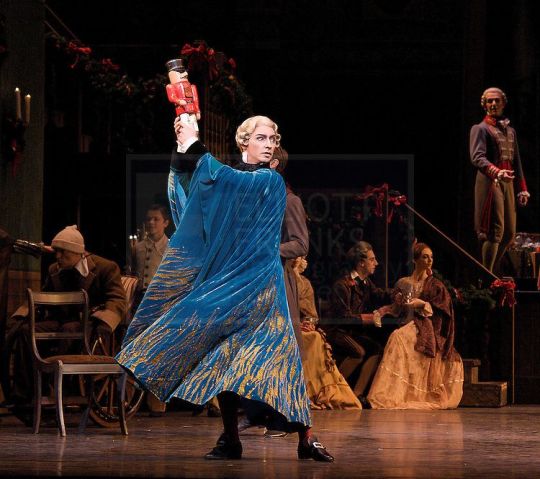
my gender is this man’s cloak
Murph is the fucking ball again
“Please tell me how you’re a monster too so I don’t feel so alone” - Jesus Christ Emily Axford
Almost getting distracted by a bird instead of picking up v obvious plot hooks: pt 2
cinderella.......dude
Brennan really looked at K’s finale scene from mismag and went “how DID the mice get lithium?”
The POV of the mice - simplifying it makes it sound ridiculous, but if you really dig into the idea of the mice as sentient beings it’s horrifying.
Dude the symbolism…stepmother eating her kids bc they were always either a tool or an obstacle to her, of course they would be a sacrifice to her hunger for power.
i’ve always liked endings that have the stepsisters reconciling w cinderella bc in the end they were also victims of abuse and it wasn’t the same or the same degree of abuse as cinderella but they were still constantly on thin ice
can you tell that i rewatched d20 live recently and sobbed at adaine and aelwyn’s ending?
Cinderella stabbing the fairy godmother with the broken heel of the shoe that symbolizes both the ending she was meant for and the life that she was forced into. Turning that into glass armor. dude.
The pumpkin carriage rotting bc the fairy godmother is trying to make the happily ever after stay exactly how it is forever but nature decays and time passes and she can’t acknowledge that without realizing both that her role is in the story is over and not only does cinderella not need her anymore, cinderella doesn’t want her anymore, and maybe never wanted her in the first place.
When puss in boots was asked what he wanted in life and he just said ‘to be comfortable’ #relatable like I know all this is gonna end with him realizing the value of love and friendship over material goods and I 100% agree with that but i feel like this goal or some variation of it are v common today and not often addressed in stories like this
Pinocchio swearing - 10/10. Also how the fuck is Lou doing a Pinocchio voice that perfectly straddles the line between hilarious and annoying. It’s ridiculous enough to always be funny, but sustainable and varied enough that it doesn’t grate on you.
i think we’re getting into “all the princesses in all the stories are all sisters” territory and i for one am THRILLED
"mirror, mirror.......leaned up against the wall”
we learn in this adventuring party that the OG concept for lou’s pinocchio is that he snapped off his nose so he would be able to lie, which is AMAZING. i fully did not put that together.
i am v excited for this battle, and v terrified.
#d20#d20 spoilers#dimension 20#dimension 20 spoilers#neverafter#neverafter spoilers#spoilers#original post#my Opinions
34 notes
·
View notes
Text
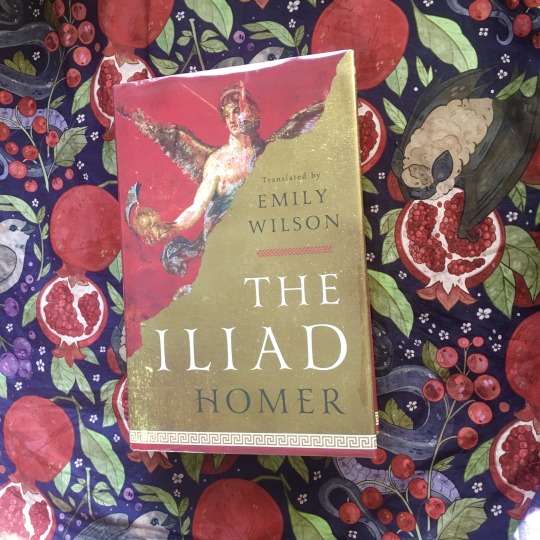
Homer’s Iliad translated by Emily Wilson - 3/5
I think I must have been assigned to read Homer’s Iliad on at least three separate occasions throughout my youth, and Sparknotesed it every time. Which I feel bad about, because I always did want to read it, or maybe I wanted the clout that came with being a person who reads Greek epic poetry. In any case, when Emily Wilson’s new translation was released last year, I finally went for it. I had read selections from her Odyssey and found her approach to translation very accessible and easy to read. There was a lot of media hype about “the first woman to translate Homer” which led to some reviewers claiming this was a feminist reinterpretation of The Iliad. My pet theory is that they had her confused for Maria Dahvana Headley, whose translation of Beowulf was intentionally transformative. In any case, Wilson’s Iliad is meant to be fairly traditional and accurate to the original text, including some metrical craft I could not pick up on. Compared to all the other times I tried to finish the Iliad, I found Wilson’s version a much easier read, so I would recommend it for that reason. The supplemental materials are also way more impressive than most editions and justify the extra cost over just a Project Gutenberg download. Wilson’s introduction is hefty to say the least, at around 75 pages, and was often more moving than the poem itself (She even defends the infamous third chapter, the Catalogue of Ships, imploring the reader to “read them out loud: in mouth and ear, the long list of names become music.” I find comparisons of superhero movies to mythology mostly kind of dumb, but I could see Homer’s audience going crazy each time their guy’s name is called in this chapter the same way people soyface about the Avengers or whatever.) She provides all the context for a beginner like me to understand the poem, but also includes an extensive glossary and notes for each chapter for those who want to dive deeper. The hardcover edition is around $40, so whether or not this masterful editing justifies the high price honestly depends on how much you like reading about guys getting stabbed over and over again. I just got it from the library.
The poem itself was not as impressive. A lot of armchair critics (NOT Wilson) love to claim The Iliad as an anti-war piece to make it palatable to modern audiences. This was not my impression in the slightest. Sure, the epic deals with the horrors of war, often brutally (as I said before, pages upon pages of vivid gory disembowelments) but it seems the product of a society which obsessively fetishized war. I’m not condemning the text based on this, but I do think it’s harder to understand without unpacking the very different set of values that were held back then, so it’s a lot easier to attempt to update the text in a really sloppy way. Wilson does give a really cogent explanation of these ethical differences which helped me understand the text more fully, but that doesn’t mean I agree with it. Every time the equivalent of a Star Trek redshirt got killed off, Homer would expound on his ancestry and life, and then conclude with something like
…Menelaus stabbed his forehead
above his nose, right at the bridge, and broke
his skull, and popped his eyeballs out.
I literally opened to a random page and found something disgusting on my first try. It’s incessant. But I can see how telling each person’s life story dignifies their death. Still, it is hard to feel any sympathy for men who did not see women as people, but as property, as goes the inciting incident of The Iliad.
5 notes
·
View notes
Text
BNHA 375 Japanese to English Translation w/ Commentary Part II
Picking up where we left off in Part I (https://at.tumblr.com/antiquity1111/bnha-375-japanese-to-english-translation-w/vwhhc282ew05), Jin (仁) means “benevolence (especially as a virtue of Confucianism); consideration; compassion; humanity; humankind; charity; altruism; human; person.”
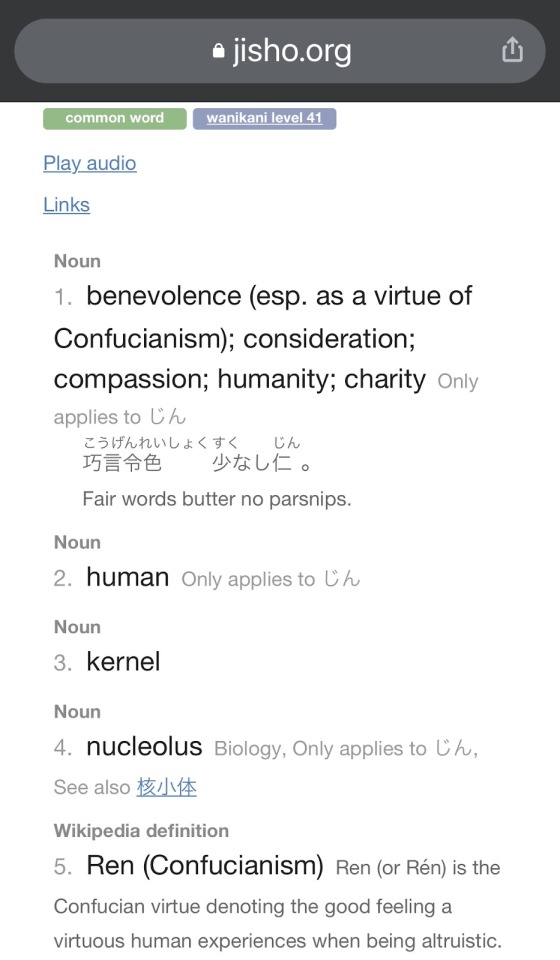
I was curious about the “kernel” definition because the first image that comes to my mind when I hear that word is a popcorn or sunflower kernel and I wasn’t initially sure how that relates to humanity, people, benevolence, compassion, etc. A kernel is the “softer, usually edible part of a nut, seed, or fruit stone contained within its hard shell.” It is also defined as “the central or most important part of something,” the core or heart. The kernel of a sentient being like a human or other animal is its soul.
Taking all of these potential definitions together, Jin (仁) can be understood to refer to and, in the context of the BNHA character, embody the brother- and sisterhood of humankind and humanity’s heart and soul. He represented the Everyman.
Jin (仁) is related to the concept of Ren in Confucianism (Chinese for “humaneness; benevolence; compassion; kindness; person of virtue”) and was broadly defined by Confucius as follows:
The person exhibiting this quality is one who “wishing to be established himself, seeks also to establish others; wishing to be enlarged himself, he seeks also to enlarge others.”
Gang Xu described Ren as empathy, defined as feeling and understanding another’s pain as intimately as if it were one’s own due to shared experience. Ren also encompasses compassion, defined as action taken to alleviate the suffering of another.
Gang Xu explained, “So, a man of Ren helps others become established if he desires to establish himself, and helps others reach their goals if he desires to reach his. Being able to make analogies between his own situations and those of others around him could be called the approach to Ren."
You might have heard the saying “do unto others as you would have others do unto you” or “treat others like you would like to be treated.” This is a simplified version of Ren adults often recite to children to encourage them to be kinder to one another. The crux of Ren can be summarized by the phrase, borrowed from Full Metal Alchemist: Brotherhood (highly recommend anime and manga!), “all is one, and one is all, and all is me.” The FMAB animanga does an awesome job of conveying the meaning of this phrase and interconnectedness of all living things across all time, space, and dimensions. This hyperlink will take you to a short YouTube video of the moment in the anime when Ed and Al begin understanding the essence of Ren:
youtube
My mother is a lover of literature and taught middle school English for many years. One of her favorite literary quotes of all time, credited to John Donne, is also one of mine and exemplifies Ren:
No man is an island, entire of itself. Every man is a piece of the continent, a part of the main. If a clod be washed away by the sea, Europe is the less, as well as if a promontory were, as well as if a manor of thine own or thine friend’s were. Any man’s death diminishes me, because I am involved in mankind. Therefore, never send to know for whom the bell tolls. It tolls for thee.
John Donne wrote these lines during the last decade of his life when he was gravely ill and grappling with an acute awareness of his own mortality and the frailty and sanctity of life. The meaning is this: However independent we might pride ourselves on being, none of us can subsist alone. By design, we are all interconnected and interdependent on one another for our survival and emotional well-being. We all have an equal share in the world, and “all” of humanity is helped or harmed when “one” is.
We should feel a sense of belonging to the whole of the human race, and should feel a sense of loss at every death, because it has taken something away from [humankind]... The suffering and passing of another human being should affect us, not least because it is a regular reminder that one day, it will be us for whom the funeral bell is tolling. The funeral bell that tolls for another person’s death, then, also tolls for us, in a sense, because it marks the death of a part of us, but also because it is a memento mori, a reminder that we ourselves will die one day.
Jin understood this concept. He lived and died by and for it. I would argue that more than his fear and confusion regarding whether he was real or a clone, more than mental illness and personality disturbance, more than being “unlucky” by Hawks’ standards, Jin was characterized by sincerity, compassion, selflessness, and a willingness—indeed, an innate feeling of *obligation*—to do unto others as he would have others do unto him. His sympathy and concern for humanity was so absolute, it extended even to the clones he created of himself and others.
If Jin’s purpose in the story was to be a personification of humanity, then symbolically, Hawks killed “humanity”; Touya, whose own name means “ignited arrow” or “arrow of light,” i.e., the one to bring to light the hypocrisy, violence, and corruption long hidden in the shadows of Hero society, saved a small part of “humanity,” unbeknownst to Hawks, and gifted it to Himiko, who mourned for “humanity”; and Himiko, whose surname, Toga, contains a kanji (渡, romaji: to, meaning “to ferry across (e.g., a river); to carry across; to traverse”) that may be an allusion to the migration Buddhists believe souls must make across the Sanzu River after death and cremation (Dabi) before they can be reborn into one of six realms of existence, was the one to “carry” and “give birth” to “humanity,” performing a miracle by bridging life and death, creating something (a person) from nothing (blood), restoring “humanity” to (second) life.
どの道このままじゃ何もできないで終わる
= Well, in any case, as it is, this will end with me not being able to do anything.
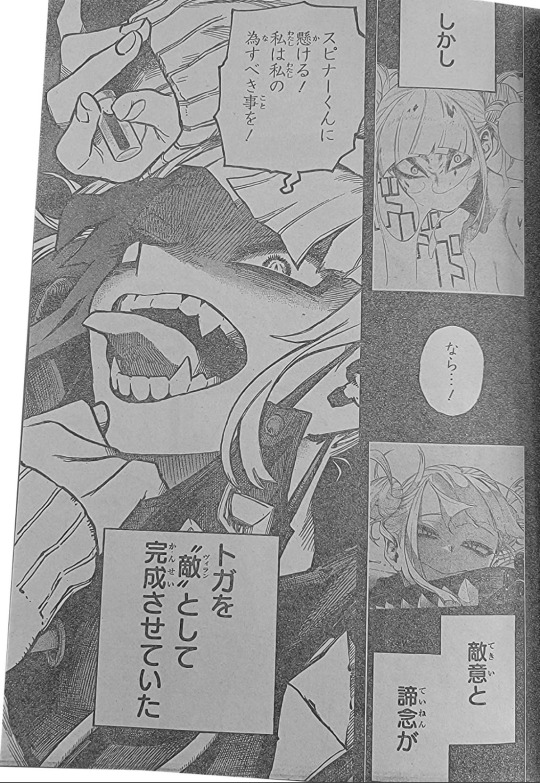
しかし
= However,
The text in the untagged (not tied to any character) square boxes are narration. Everything else is Himiko’s internal dialogue. She does more thinking than speaking in this chapter.
なら…!
= If that’s how it is…!
敵意と
= hostility
諦念が
= and resignation
スピナーくんに懸ける!私は私の為すべき事��!
= I’ll bet it all on Spinner-kun! [I’ll bet] what I should try to do [on him]!
Among other definitions not relevant to the context, 為す (romaji: nasu) means “to do; to perform; to intend to; to attempt; to try.” べき (romaji: beki) means “should; must; ought to.”
Because Himiko is wagering her escape or capture on an uncertainty (Spinner successfully reclaiming Kurogiri for the Villains and coming to her rescue with Warp Gate), I translated nasu as “try to do.” She is hoping her efforts to resist the Heroes’ offensive will not be for nothing, but she cannot be sure that she won’t have used Jin’s blood only for them both to be defeated.
トガを"敵"として完成させていた
トガを"ヴィラン"としてかんせいさせていた
= completed her transformation into a “Villain” (read as: “enemy”).
See the quotation marks around “Villain / enemy”? Maybe they mean something, maybe they don’t, but every time I see a word written inside quotation marks like that, I pause and ask myself, “Why is this word being written as if it were someone else’s phrasing, as if the word would be read aloud by a person making air quotes with their fingers, as if the degree to which the word in quotation marks matches the person or thing being described is meant to be questioned?”
What does it mean to be a “Villain”? What does it mean to be a “Hero”? Do these words have any real validity when Heroes also kill and Villains also protect? When the “line” differentiating Heroes from Villains and Villains from Heroes is so fine as to be almost imperceptible except in the most extreme of cases (literally, AFO), who decides who to label a “Hero” and who to label a “Villain”? Who benefits from dividing people into rigid, blanket categories of “good, righteous” and “bad, monstrous”? Where, when, and why did these terms originate? Can any society that promotes social division truly be just?
Himiko has become a full-fledged “Villain / enemy,” but by whose rubric? In whose eyes is she a “Villain / enemy”? She was certainly not a “Villain / enemy” to Jin. He looked at her and saw only a kind, sympathetic, endearing girl who ought to be nurtured and shielded from harm. And to Tomura, Touya, Spinner, and Atsuhiro, she is a dear friend and comrade, not a “Villain / enemy.” It is Heroes and civilians who view Himiko as a “Villain / enemy,” an adversary to be dealt with, a problem to be solved. This should not surprise anyone. Himiko is, after all, a “Villain / enemy” by definition. So why is that word in quotation marks? I suspect the answer can be found in Tomura’s monologue from No.281. You can read my full Japanese to English translation for it here: English vs. Japanese Translation Comparison for Tomura’s 281 Speech: https://at.tumblr.com/antiquity1111/bnha-english-vs-japanese-translation-comparison/z5l7sqh0lqql.

来た!
= There it is!
来た (romaji: kita) is the ta-form (or past tense) of the verb 来る (romaji: kuru), meaning “to come (spatially or temporally); to approach; to arrive,” and refers to Himiko having finally brought out a vial of blood to consume for Transform, as Tsuyu had been expecting her to do. This line sounds more natural in English translated like this, as Viz’s translator, Caleb Cook, rendered it, than it would translated literally as “[It] came!”
血のストック!
= Her stock of blood!
AFO⁉︎ 死柄木⁉︎ 誰の血だろうと
= AFO!? Shigaraki!? [No matter] whose blood it is,
それをさせない為の‼︎
= I won’t let you do that!!
梅雨ちゃんは冷静…
= “Tsuyu-chan is levelheaded…”
冷静 (romaji: reisei) is an adjective meaning “calm; composed; cool (of emotion); serene; presence of mind.” Composure is defined as “the state or feeling of being calm and in control of oneself.” Presence of mind is defined as “the ability to remain calm and take quick, sensible action.” Levelheaded is defined as “calm and sensible.” These words all more or less mean the same thing. Himiko is describing Tsuyu as a person who is generally not swayed by nervousness, anger, or other strong emotions. This characteristic detachment allows Tsuyu to make sound judgments even under duress. She’s not the most energetic, enthusiastic, or expressive person, but she’s grounded, reliable, and performs well in high-stakes situations.
そこね
= There.
This isn’t particularly important to the overall chapter, but let’s talk about this word for a moment anyway. Depending on how we read it, the meaning changes. If we read it as one word, そこね (romaji: sokone), then Himiko is reflecting on Tsuyu’s failure to do something that she needed to have done successfully: destroy Twice’s blood. Assuming that was Horikoshi’s intention, then I would translate そこね as “Too bad,” as in “Good job, Tsuyu-chan, you destroyed my vial. Too bad it was a fake and you played right into my hands!” If we read そこね as two words (romaji: soko ne), then the meaning would be “There,” as in “There, I got her,” with ne acting as a filler word. This is the translation I went with because I lean toward this being the meaning Horikoshi intended. The difference between these potential translations is in whether Himiko is focused on Tsuyu (“Too bad [for you]”) or her mission (“There”), with the chapter’s emphasis on Himiko strategizing for the first time and her own thought process throughout the chapter clarifying that she has moved beyond any interest she might have had in Izuku, Ochako, or Tsuyu and is now squarely committed to actualizing her goal of eradicating Hero society and eliminating the Heroes that uphold it.
だからそれはフェイク
= “That’s why that’s a fake.”
AFOさんがくれた"脳無を引きつけるお薬"です
= “It’s a ‘chemical that attracts Noumu’ that AFO-san gave me.”
Slow down and reread Himiko’s last few (spoken) lines. She said, “Tsuyu-chan is levelheaded… That’s why that’s a fake.” In other words, Himiko, AFO, or both anticipated that Tsuyu (and Ochako, I’m sure) would try to isolate her for attack and used the information she had acquired about Tsuyu’s personality, blind spots / weaknesses, and fighting style from past encounters to develop a countermeasure against her. (They probably also brainstormed a special plan of action for dealing with Ochako, but we’ll have to wait to find out!)
Did you notice the quotation marks around “脳無を引きつけるお薬”? Those aren’t Himiko’s words. The context makes clear that she is quoting AFO when she says “chemical that attracts Noumu.” That is how AFO described it to Himiko and how she is describing it to Tsuyu.
薬 (romaji: kusuri) is a noun meaning “medicine; pharmaceutical; drug (legal or illegal).” Pikahlua translated 薬 as “medicine” and Caleb as “chemical.” Technically, both are right. Kusuri can refer to a chemical, especially a toxic chemical, used for its effect on living organisms. Examples include insecticide, herbicide, and chemical warfare. For me, a medicine is something used to treat a physical ailment of some kind, like a bacterial infection or a burn, and a drug is a substance that produces a physiological effect when ingested or otherwise introduced into the body, like marijuana, hallucinogens, opiates, or alcohol. I think of healing when I think of medicine, so in my mind, “drug” is the better of the two translations (medicine vs. drug). However, it was Tsuyu breaking the vial containing the mysterious liquid, exposing it to the air, that caused it to take effect, drawing the Noumu in, which is precisely how chemical attractants work. AFO gave Himiko a chemical attractant for Noumu and Tsuyu accidentally coated herself in it. I think “chemical” is the best choice of translation for kusuri, so that is the word I used.
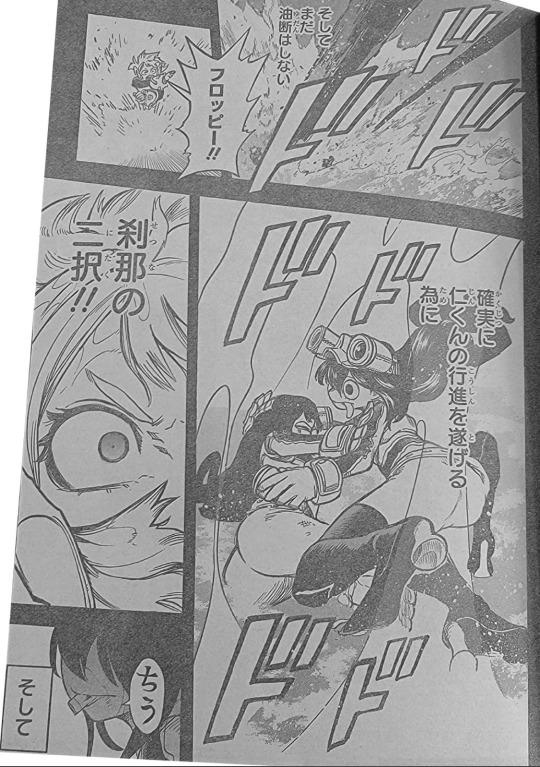
そしてまだ油断はしない
= I can’t let my guard down yet.
フロッピー‼︎
= “Froppy!!”
確実に仁くんの行進を遂げる為に
= In order to carry out Jin-kun���s march without fail,
遂げる (romaji: togeru) is a verb meaning “to accomplish; to achieve; to carry out; to arrive at (a certain outcome); to come to; to end with.” If you also read Pikahlua’s translation posts, then you’ll know that they translated this word as “achieve,” and they weren’t wrong to do so. I translated it as “carry out” because Touya and Himiko had discussed using Jin’s blood to keep the Miserable Parade marching for Jin (and for themselves) in No.341, with Touya specifically saying, “Let’s [let] the Miserable Parade continue [in Twice’s honor]. The ones to laugh at the end of it will be us.” This isn’t something they’ll be doing for themselves (or for each other) alone. This is something they’ll simultaneously be doing for Jin, whose march came to a sudden, violent end when he was murdered. Touya worded his sentence as if he and Himiko will be doing Jin a favor by continuing the Miserable Parade in his stead, so they will, in effect, be carrying something out (the Miserable Parade) on someone else’s behalf (Jin’s).
刹那の二択‼︎
= for the moment [there are] two options!!
二 (romaji: ni) means “two.” 択 (romaji: taku) is a counter for choices, options, etc. I’m not sure why Caleb translated this line as “I have to make an instant decision!!” His translation, coupled with the placement of the text over half of Ochako’s stunned face, implies that it is Ochako thinking that she must quickly pick out who is the real Tsuyu and who is the imposter (how cliche), but I’m fairly certain that this is the second half to the previous sentence fragment (‘in order to carry out Jin-kun’s march without fail…’). Given that Himiko has already caught Tsuyu in a well-timed trap using the fake blood (actually chemical attractant for Noumu) and is attempting to create another diversion (her capricious, over-the-top Izuku-related antics at the start of the war were also a distraction intended to buy time for her comrades) to stall for more time for Spinner to retrieve Kurogiri and warp her off the island to another location, it only makes sense for this line to be a continuation of the prior one. This chapter is heavily centered on Himiko and highlights her development from a whimsical girl with a traumatic past and criminal history to a mature “Villain” who is clever, astute, and powerful enough to more or less single-handedly decimate Japanese civilization.
ちう
As Pikahlua noted in their translation post for No.375, “This is a verbalized sound effect Tsuyu makes when she sticks her tongue out.”
そして
= And then…
This is the Narrator (Horikoshi).
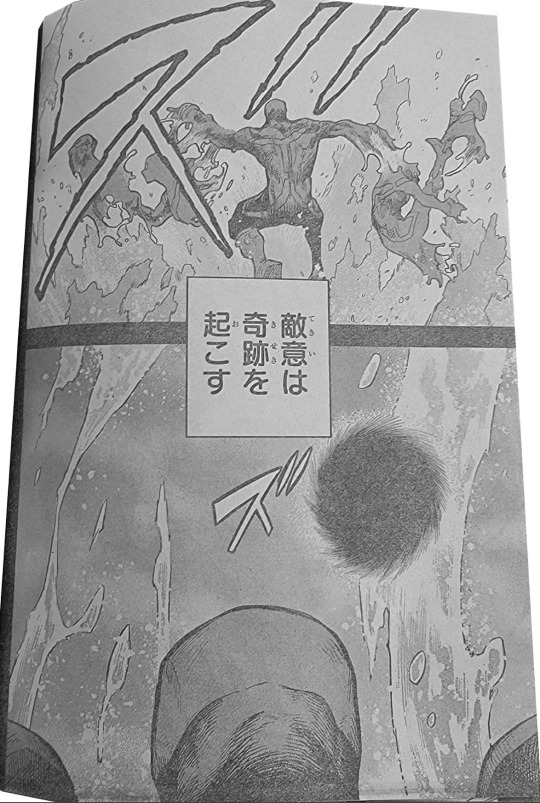
敵意は奇跡を起こす
= her hostility brought about a miracle.
That’s Himiko, Transformed into Twice and making clones who are themselves making clones, all of whom are wearing Twice’s black bodysuit. If you look carefully at the two already partially formed clones, you’ll notice they both have the beginnings of the gray horizontal and vertical line designs of his costume.
For reference, this is Twice’s uniform:
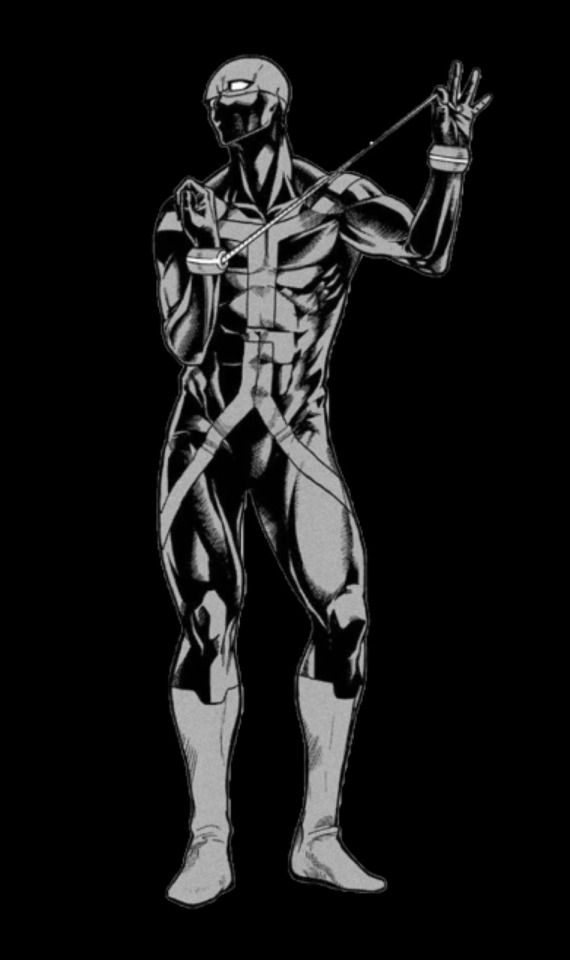
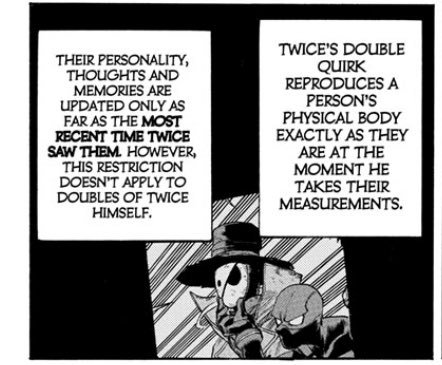
The clones Himiko creates don’t seem to be the least bit confused about where they are or startled to be alive (Double produces a genetic copy of a person as they were when the user last saw them; because Himiko last saw Jin when he was dying, an authentic clone of Jin should retain his memories of being betrayed and killed by Hawks and should be disoriented, even distressed; after all, he was distraught when he died, and how can he be alive if he remembers dying?).
The clones Himiko creates need no direction from her to know to begin multiplying. The only plausible explanation I can think of is that these are clones of Himiko herself Transformed into Twice so that she can access Double while still being able to use Transform. To be able to create a clone of Twice himself, Himiko would first need to take her measurements while Transformed, as a person using Double can only create a clone of a person whose exact measurements they know, which is why Twice’s Quirk involved the use of measuring tape. It is, of course, possible that Himiko’s original Transformation into Twice was “off-screened” and that she took her (his) measurements while Transformed in preparation for the war, which would allow her to create clones with his personality and memories without delay. If she also created a clone of Twice at that time, then she could bypass needing to explain the situation to Jin to catch him up on everything that has transpired since his passing as well as the emotional shock for both of seeing him reanimated. Unfortunately, that would mean that their reunion happened off-screen and if we are shown it at all, it will be in a flashback. The logic in doing this would be for her instantaneous Transformation into Twice to surprise us and to ensure that the focus remains on Himiko, rather than Jin, a dead character, overshadowing her, a living character. Jin is continuing to influence the story in death through other characters, particularly Himiko, but he is dead and cannot be allowed to outshine characters whose narrative arcs are still ongoing.
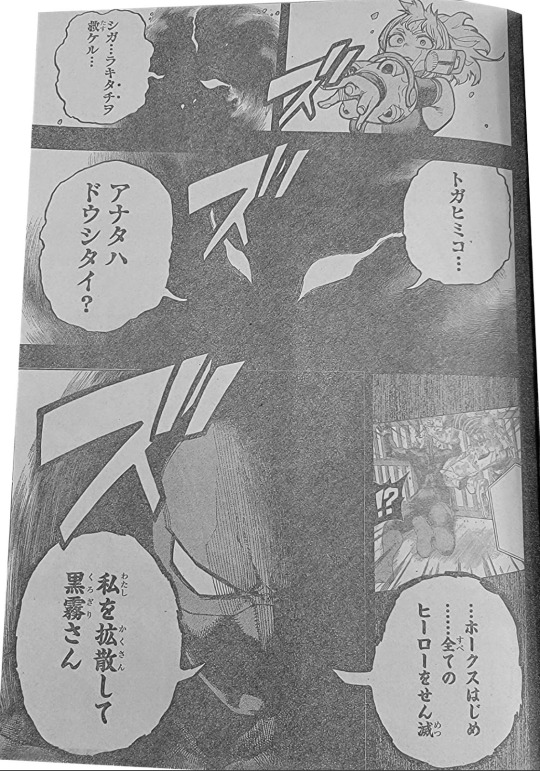
シガ…ラキタチヲ救ケル…
= “[I will] save Shiga… raki and his comrades…”
Do you see the little black dots to the right of タチ? They’re called bouten, or “side marks.” They are written in the furigana space above horizontal text or to the right of vertical text to express emphasis, similar to italicized or bold text. タチ is also written in katakana, further emphasizing it.
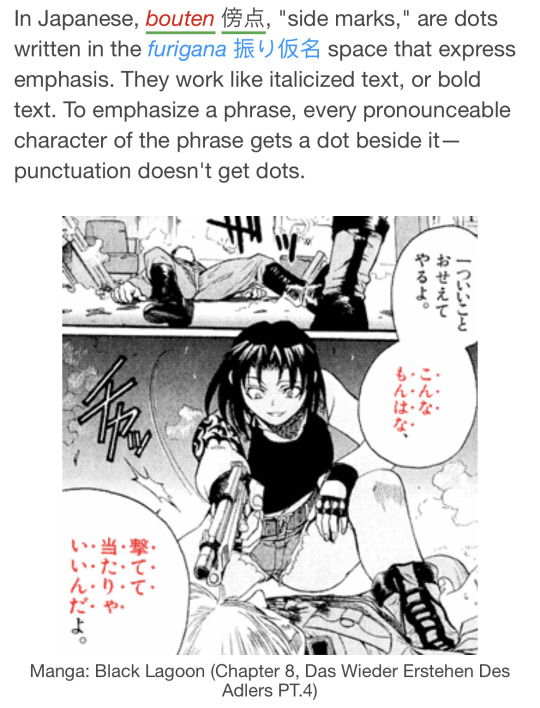
The word being emphasized is タチ (romaji: tachi), more commonly written たち or 達, a suffix that is used almost exclusively for people and attaches to a noun or pronoun to make a quasi-plural representing a group of people to which that noun or pronoun belongs. Let’s look at some examples so we can better understand how it works. 俺 (romaji: ore) is a first person pronoun meaning “I; me; my; myself.” 俺 (romaji: ore) + たち (romaji: tachi) = 俺たち (romaji: oretachi), meaning “we; us; our; ourselves.” 子供 (romaji: kodomo) is a noun that means “child.” 子供 (romaji: kodomo) + 達 (romaji: tachi) = 子供達 (romaji: kodomotachi), meaning “children.”
In Kurogiri’s sentence, -tachi attaches to Shigaraki. When -tachi combines with a noun like a person’s name, it can be loosely translated as “and company” and refers to that person in addition to the group of people of which they are a part. It is often translated as “and the others,” but that does not necessarily capture the nuance of togetherness implied by -tachi. Who are “the others”? What is the relationship between “the others” and the noun or pronoun? Everyone who votes in an election is a registered voter, but they are not all affiliated with the same political party or voting for the same political candidates. Similarly, Tomura is a Villain, but he does not associate with or represent all Villains. Accordingly, Kurogiri is not interested in helping every Villain. He is only striving to help Shigaraki-tachi, or the group of people of which Shigaraki is a part. The common translation (“the others”) sounds better, but the latter clarifies that when Kurogiri says “the others,” he only means the other members of Tomura Shigaraki’s League of Villains: Spinner, Dabi, Toga, and Mr. Compress. (Kurogiri had been in captivity for several months at the point that Jin was killed, so he should not know about that and might still be including him as someone he must save, unless we are to assume Spinner informed him of Jin’s death).
Viz’s translator, Caleb Cook, opted for “Shigaraki and his allies,” which isn’t a bad translation per se but does have the effect of creating distance between Shigaraki and the others that does not exist in Japanese. This is something he periodically does that downplays the strong emotional bond between the members of the League of Villains and makes it seem as if they are more like coworkers or business partners who begrudgingly tolerate one another than they are close friends or family when that couldn’t be further from the truth.
Like Jin, Tomura uses the word 仲間 (romaji: nakama) for the League of Villains. That is a neutral word for a “companion; fellow; friend; comrade; partner; colleague; coworker; associate; teammate.” Typically, it describes people who are working together toward something and collaborating for mutual success. Nakama connotes a sense of camaraderie and community and can also refer to a close, family-like relationship between people not related by blood or marriage. This is the word that Luffy from One Piece uses for his crewmates.
Let’s further define some of those definitions, shall we? Beginning with “ally,” because that is the word Caleb used, Merriam Webster defines an ally as “one that is associated with another as a helper; a person or group that provides assistance and support in an ongoing effort, activity, or struggle.” The Cambridge Dictionary defines an ally as “someone who helps and supports someone else.” Dictionary.com defines an ally as “a person, group, or nation that is associated with another or others for some common cause or purpose; a person who supports or cooperates with another; a supporter.” Maybe it’s just me, or maybe it’s because this is the word countries use to describe their tentative alliances with neighboring countries, but the relationship between allies strikes me as impersonal and fragile, liable to break at a moment’s notice when circumstances change and/or someone feels threatened.
Compare that to the definitions for companion and comrade. The Merriam Webster Dictionary defines a companion as “one that accompanies another; one that keeps company with another.” The Longman Dictionary of Contemporary English defines a companion as “someone you spend a lot of time with, especially a friend.” Wiktionary defines a companion as “a friend, acquaintance, or partner; someone with whom one spends time or accompanies.” Webster’s New World College Dictionary defines a comrade as “a person who shares interests and activities in common with others; partner; associate.” Comrade is defined by Merriam Webster as “an intimate friend or associate; a fellow soldier.” The Cambridge Dictionary defines a comrade as “a friend or trusted companion, especially one with whom you have been involved in difficult or dangerous, usually military, activities.” Related is the phrase “comrade in arms” or “brother in arms,” often heard in World War I and World War II movies and games in reference to soldiers who risk their lives to fight alongside and rescue one another from certain death. Dabi and Twice were described as being “brothers in arms” in Ultra Analysis: The Official Character Guide. Below is more on the meaning of that phrase and the deep bond it describes.
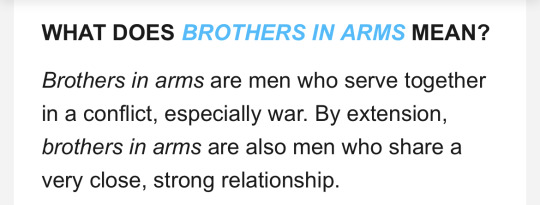
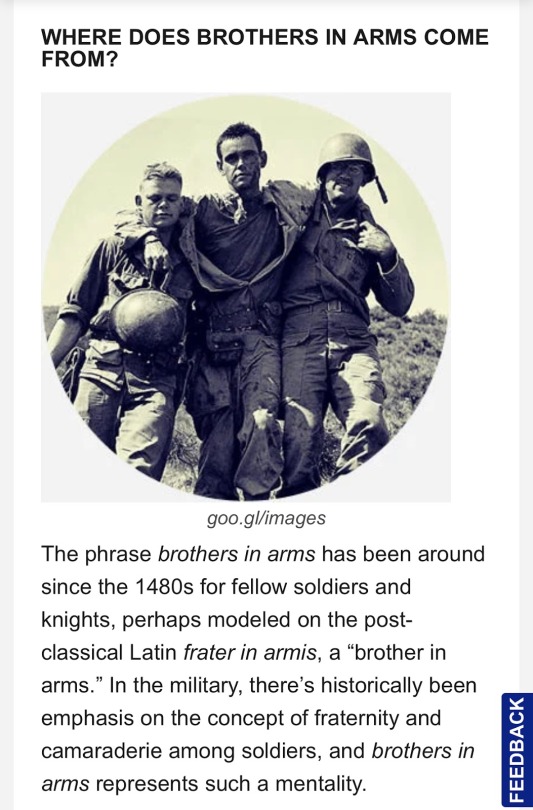
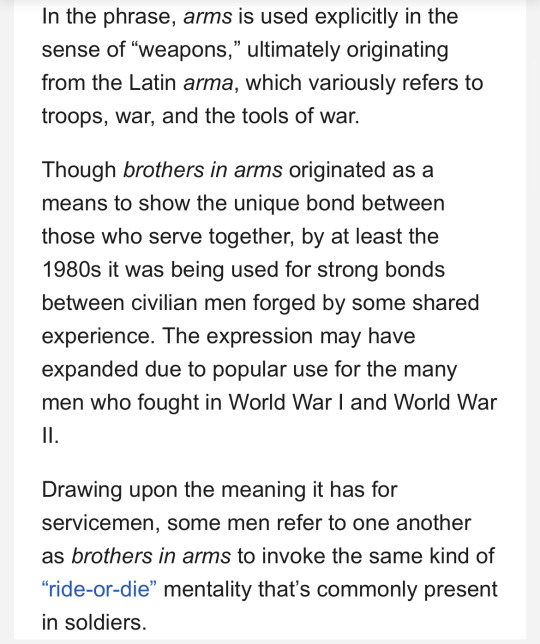
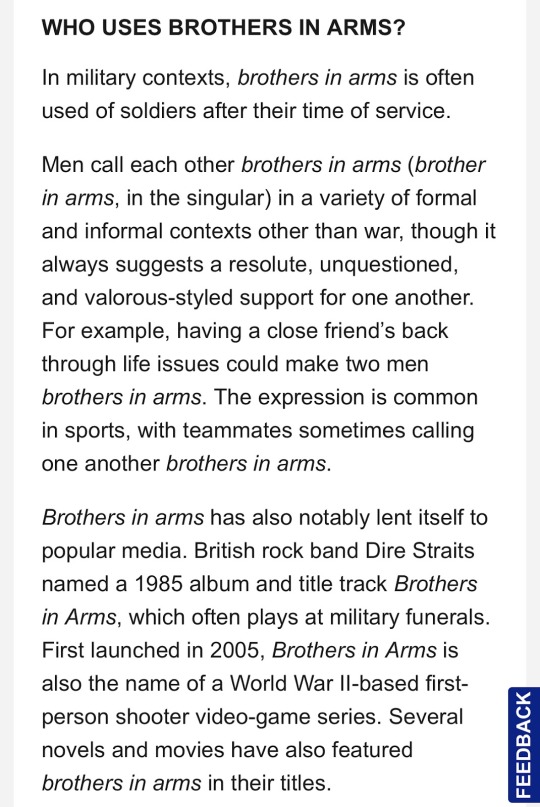
Hopefully, by now, you understand why I disagree with Caleb’s decision to keep reducing the League of Villains’ relationships to “associates” or “allies” when Tomura himself used a word for them that can also mean “companion,” “comrade,” or “friend,” words that suggest warm connections and sincere attachment that is more befitting of how the League of Villains actually behaves than the colder “associates” or “allies” implies. I mean, Atsuhiro had literally been captured by a Hero and was dangling from the sky by carbon fiber wires, choking for air, with the war seeming to be lost when he publicly declared, “I loved the League of Villains,” breaking cultural norms against such forward expressions of affection, and gouged his own side out to provide the others with a chance to escape, fully believing he would die in the process and committing to doing it anyway for their sake. How many people would be willing to lay down their life for someone they work with? Not a friend, definitely not family, but a coworker, just another rank and file employee, a faceless name Sharpied on a paper tag taking up one of the seats at Monday morning’s meeting? Very few. Personally, my preference is for “comrade” because it combines the friendliness and familiarity of a friend or companion with the shared mission of brothers (and sisters!) in arms.

トガヒミコ…
= “Himiko Toga…”
アナタハドウシタイ?
= “What do you want to do?”
…ホークスはじめ……全てのヒーローをせん滅
= “... Starting with Hawks…… [I want to] annihilate all Heroes.”
私を拡散して黒霧さん
= “Distribute / scatter me [around], Kurogiri-san.”
Himiko seems to be requesting that Kurogiri send clones of her (or Twice, or both) to as many sites as possible. Warp Gate relies on geographic coordinates to open portals at specific locations, so for Kurogiri to have found Himiko, Skeptic would have had to feed him that information. Recall that Skeptic is monitoring every battlefield from wherever he is hiding and using space satellites to track everyone. He was also shown to be smuggling something underground, presumably into the evacuation shelters at UA, where the civilians were gathered after the first war and remain, insufficiently protected, if they are being guarded at all, due to the shameful number of Heroes who retired and/or fled to other countries in the aftermath of the PLF War when public opinion of Heroes soured. Yes, Principal Nezu paid a whopping $7 million out of pocket for security upgrades to defend against exterior attacks, but did the Heroes also plan for a Villain Trojan horse, for an attack from within the walls of their formidable fortress? AFO’s affiliates are still awaiting orders from their position inside UA’s evacuation shelters with the frightened civilians. There are still two Near High-End Noumu who are unaccounted for. Could they be in the steel crate Skeptic is moving underground toward… something? It is certainly possible. If the Near High-End Noumu are unleashed on the unsuspecting civilians, they will be forced to break the law by using their Quirks to defend themselves without a permit or license. The majority of Japan’s population will, in effect, become criminals, i.e., “Villains.” What’s more, the world Destro, Redestro, and the Meta Liberation Army dreamed of will have been realized, with everyone with a Quirk freely using theirs. And perhaps, in the absolute pandemonium of that hellscape, the civilians, who were long ago stripped of their powers and made to rely on Heroes to protect them, will discover that they are perfectly capable of protecting themselves if they can only put aside their differences and prejudices to look after one another. And so they, too, will become “heroes.” Notice that lower case h! In Boku no Hero Academia, a capital h Hero is a person officially authorized by the Hero Public Safety Commission (HPSC) to use their Quirk to fight Villains. It is illegal to use your Quirk to fight Villains without a provisional or professional license. If the civilians break the law to use their Quirks to defend against an internal attack, they will not have become capital h “Heroes,” but they will have become lower case h “heroes.”

待てええまだ——!
= “Waaaiiit, not yet——!”
私まだあなたと恋バナしてない!
= “I still haven’t talked about [my] crush / love interest with you!”
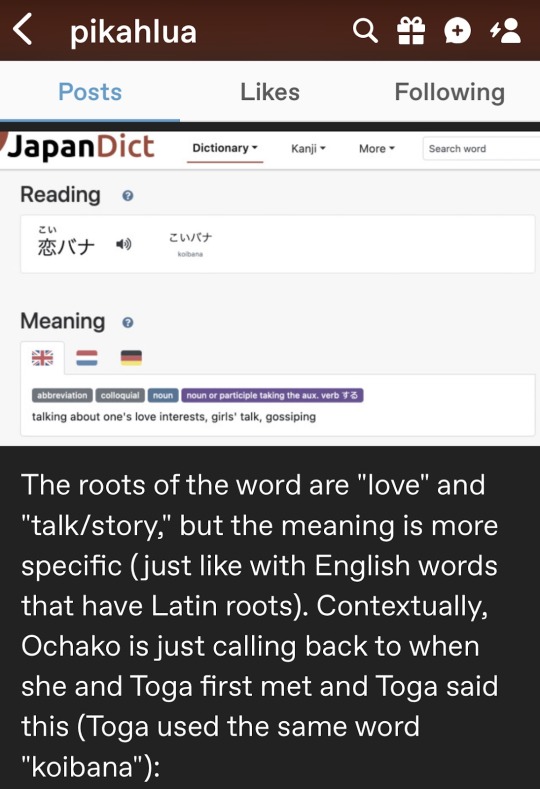
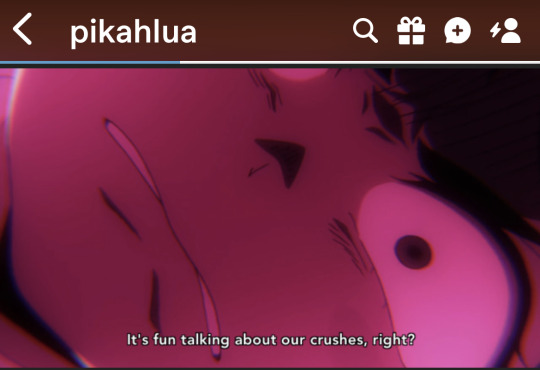
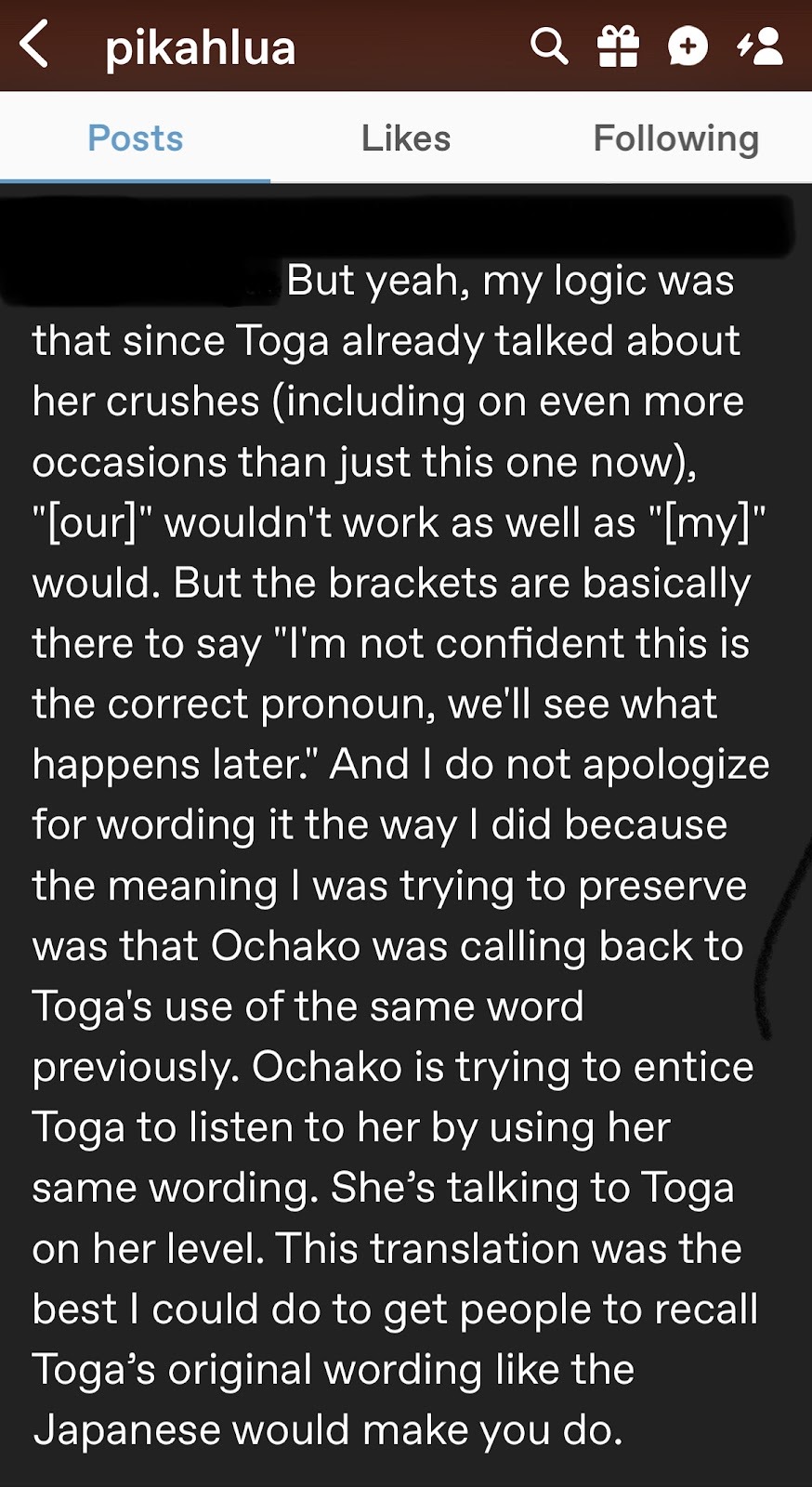
I’ve seen several fans active in the Twitter fandom interpreting Ochako’s call out to Himiko as a genuine plea for the two of them to talk and hopefully connect. I disagree and think that that is a misunderstanding of Ochako’s motivations. Like @lloftvlly on Twitter noted, Ochako has always been painfully honest with Himiko about not being interested in sharing “girl talk” or being her “friend.” She is a Hero and her priority is saving lives. The last thing she wants to do is talk about romance, least of all with her enemy, especially when people’s lives are at stake, but Himiko’s already Transformed, Doubling, and about to escape to another battlefield using Kurogiri’s Warp Gate. Ochako has lost control of the situation. She probably also overheard Himiko telling Kurogiri that she intends to kill every Hero, beginning with Hawks, who specifically entrusted Ochako with subduing Himiko by any means necessary. Ochako is desperate, and it is this desperation that prompted her to call out to Himiko in the hope that she could coerce her into staying, that she could contain the damage Himiko has promised to deal to the Hero side to Okutou Island. Ochako is a Hero and her priority is saving lives. That is why she called out to Himiko. It didn’t work because Himiko’s grief and anger over Jin’s murder outweighs any desire she once had of peacefully coexisting with Heroes like Izuku and Ochako.
お茶子ちゃん…‼︎
= Ochako-chan…!!
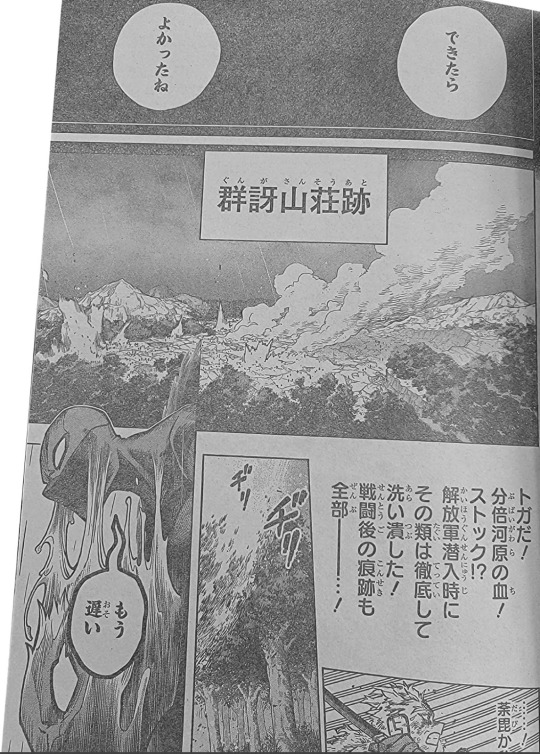
できたらよかったね
= “If we could have [done that] / had been able to [do that], that would have been nice.”
できたら (romaji: dekitara) is the ta-form (past tense) of the verb できる (romaji: dekiru), meaning “to be able (in a position) to do,” and よかった (romaji: yokatta) is the ta-form of the adjective よい (romaji: yoi), meaning “good; excellent; fine; nice; pleasant; agreeable.”
It is important to understand that Himiko’s use of the ta-form of these words indicates that this is something she would have liked to have happened in the past but has since moved on from.
群訝山荘跡
Gunga Mountain Villa Ruins
トガだ!分倍河原の血!ストック⁉︎解放軍潜入時にその類は徹底して洗い潰した!戦闘後の痕跡も全部ーーー…!
= That’s Toga! Bubaigawara’s blood! [She had that in her] stock!? When I infiltrated the Liberation Army, I thoroughly washed away anything like that! Even / also all traces from after the battle———...!
も (romaji: mo) is a common particle and adverb with a variety of meanings and uses. Here, も means “too; also; as well; even.” The inclusion of も matters because it means that Hawks scrubbed all evidence of Jin from the murder site IN ADDITION TO someplace else, presumably all of Gunga Mountain Villa or even Gunga Mountain itself. Hawks and his associates scoured *every inch* of the area to erase all remnants of Jin and ensure no part of him could be recovered and used by the Villains. Recall that during and in the days following the PLF War, Gunga Mountain was overrun with Heroes. They arrested more than 100,000 soldiers of the Meta Liberation Army. Jin’s body would have been bagged and tagged by the Heroes storming Gunga Mountain Villa, along with everything and everyone collected. On Hawks’ orders, Jin’s body would have been immediately incinerated to destroy all blood, skin, flesh, bone, bone marrow, anything that could be used to power an attack against the Heroes by a person with the right Quirk (or to prove that Hawks had stabbed Jin in the back as he was fleeing from him, meaning Hawks had been on offense, NOT defense, when he “pulled the trigger,” so to speak). Hawks’ priority when confronting Jin was to save lives, sure, but not Jin’s. From the moment Hawks infiltrated the Paranormal Liberation Front, he was prepared to kill to “neutralize the threat,” as is his method and the HPSC’s way.
When Hawks learned that Jin had overcome his fear of using Double to its full potential, he determined that he had become the Villains’ “greatest asset” and a more imminent threat than Shigaraki. He resolved to kill him if he could not make good use of him (by coercing him into abandoning his allies, the LoV and MLA, with empty promises of helping him to “start over,” no doubt on the condition that he would ally with the Heroes to take down Shigaraki and the others, like Gentle Criminal, La Brava, and Lady Nagant are doing now). Hawks thinks and operates like he is playing a chess game where Villains and Heroes are pieces on the board for him to move and sacrifice as needed to achieve his objectives, i.e., completing missions. He is nothing if not efficient and cutthroat. He even alludes to such here (No.255, pg.14):

There is plenty to be said about how Keigo was conditioned by the HPSC. Ultimately, however, he has spent more years of his life as “Hawks” (~17 years) than “Keigo” (~6 years). His identity formed around being a soldier and state-sponsored killer. It has become who he is. He carries out his orders without a hint of remorse. He (usually) does not hesitate to kill people because in his mind, he is not so much killing *people* as he is neutralizing *enemies*. He does not reflect on his extrajudicial murders because he is so certain of being in the right. He can also rest assured he will be supported by his fellow Heroes, and no, the “younger generation” are not “exceptions to the rule,” as evidenced by Tokoyami’s automatic justification of Hawks’ crime. Hawks is a masterful manipulator and social chameleon, a man of many “faces,” taking on the shape that best suits him at any given moment to satisfy his ends. He takes pride in his ability to mislead, hoodwink, and double-cross others. He knows he is a skilled liar and is eager to boast about it, which he literally did as Jin, a severely mentally ill man, lay sobbing before him, losing his mind over how he could have been so stupid as to trust Hawks and lead him right to the League of Villains.
Hawks would not have walked into his confrontation with Jin without a contingency plan in place to mitigate the risk of Toga acquiring Jin’s blood should he refuse to comply with Hawks’ demands and be killed. To argue otherwise would be to insult Hawks’ intelligence. The Heroes stationed at Gunga Mountain Villa to gather evidence for future prosecutions would also have been assigned responsibility for bagging and tagging Jin’s corpse and delivering it to a crematorium, unless they chose instead to destroy his body where it fell. In No.375, Hawks takes credit for meticulously “washing away” all that had remained of Jin after he killed him, implying that he was personally involved in both the disposal of the body (otherwise, how could he be certain Toga had not accessed it?) and the cleanup afterward. We know that Hawks was unconscious, on the brink of death, and being treated for serious burn injuries while the PLF War raged on. We know that Hawks voluntarily discharged against medical advice within a day of regaining consciousness and asked Best Jeanist to take him to visit both Tomie’s HPSC-funded house and Endeavor at Central Hospital. He was in a car with Best Jeanist and Endeavor tracking Deku’s movements for several weeks. Then he partnered with Tsukauchi, All Might, and other Pro Heroes to devise a strategy for the upcoming war. When would he have had time to take the bullet train across the country to the Gunga Mountain Villa Ruins? Are bullet trains even still running post-war? For reference, Shouji is at Central Hospital and Endeavor and AFO are at the Gunga Mountain Villa Ruins.
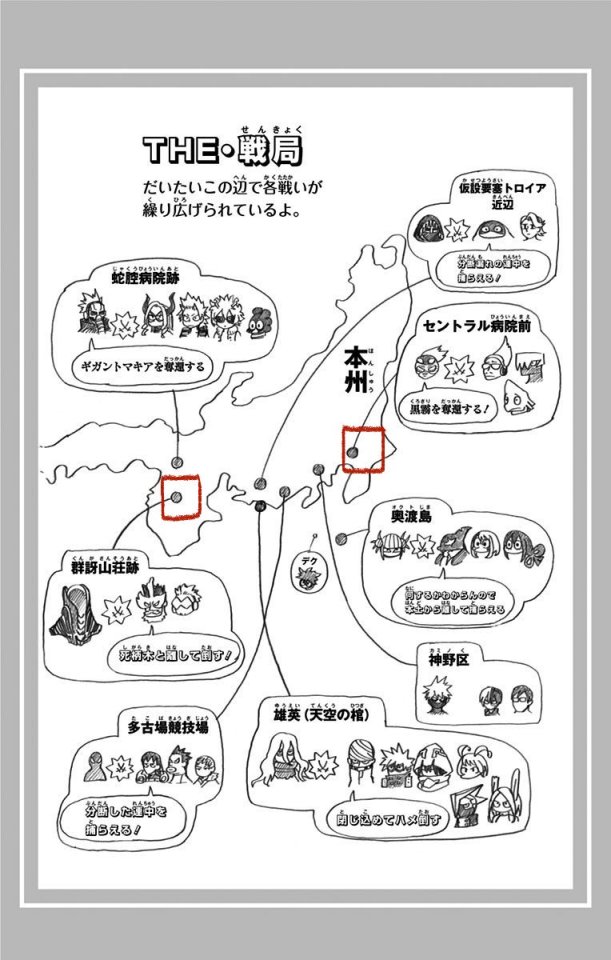
The most probable explanation seems to be that Hawks had considered the possibility that Jin would not cooperate with him and arranged to have people on standby prepared to scrub Jin from the area to prevent a situation like this. At some point before the events of Villain Hunt, Hawks returned to Gunga Mountain Villa with the equivalent of a commercial grade power washer for the express purpose of destroying any remnants of Jin’s body that might have been overlooked by the cleanup crew, in effect erasing him, so it should not have been possible for Himiko to collect a sample of his blood, hence his surprise.
……!荼毘か⁉︎
= ……! Dabi [did this]!?
もう遅い
= “It’s too late.”
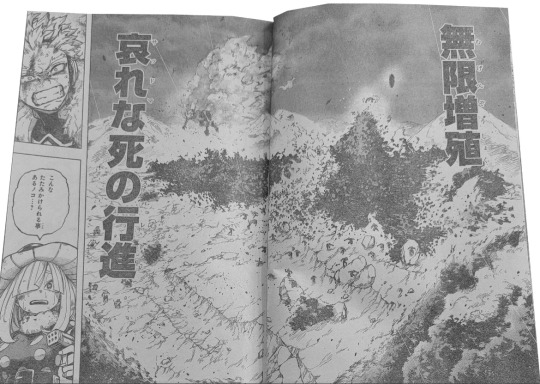
無限増殖
Infinite Doubles
哀れな行進
サッドマンズパレイード
Sad Man’s Parade (read as: Miserable Parade)
こんなたたみかけられる事あるノコ…?
= “Has [anyone] ever piled on like this before, shroom…?” or “Has something like this ever been achieved before, shroom…?”
こんな (romaji: konna) is an adjective meaning “such (about something/someone close to the speaker, including the speaker), or about ideas expressed by the speaker; like this; this kind of.” たたみかけられる (romaji: tatamikakerareru) is the potential form of the verb たたみかける (romaji: tatamikakeru) meaning “to pile on; to press on” or “to press for an answer; to shower questions on someone.” 事ある / 事成る (or ことなる, romaji: kotonaru) is an intransitive verb meaning “to come to pass; to be realized; to be fulfilled; to be achieved.”
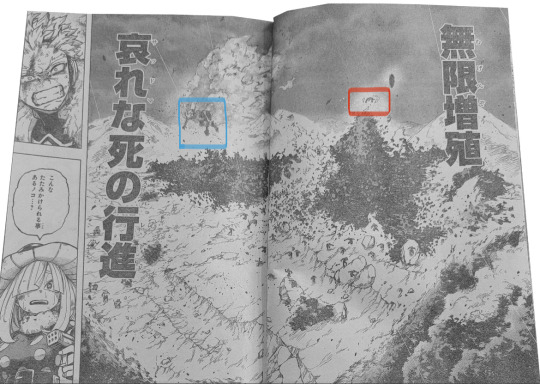
This is the same screenshot. In the red is Himiko falling from Kurogiri’s portal and creating clones of herself, each one Doubling. In the blue is Touya flying over the area, setting fire to the forest and scorching the earth. The furigana read “Sad Man’s Parade,” but the kanji read “Miserable Parade,” so that is the real meaning. This is the event Touya and Himiko planned in No.341. Back then, Touya assured Himiko that at the end of the Miserable Parade the two of them would be laughing. Right now, they are poised to eliminate every remaining Hero and devastate Japan’s population. One thing about Himiko… is she always uses people’s Quirks to their full potential. She may not be the strongest League of Villains member, but she might just be the deadliest. She’s lethal.
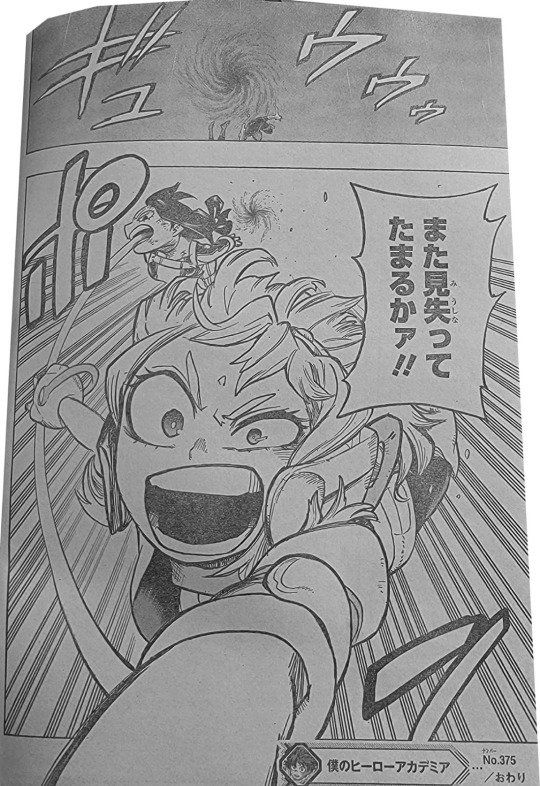
また見失ってたまるかァ‼︎︎
= “I won’t lose sight of you again!!”
たまる (堪る, romaji: tamaru) is a verb meaning “to bear; to endure.” Translated literally, Ochako says, “I can’t bear to lose sight of you again!” Tamaru often adds emphasis (e.g., “I can’t believe that!” versus “I’ll be damned if that’s true!”). Ochako is saying that she definitely won’t allow Himiko to escape.
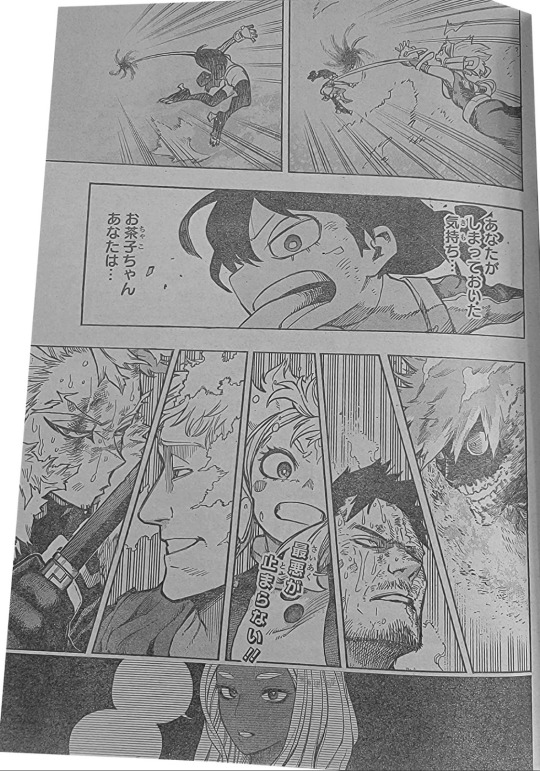
あなたがしまっておいた気持ち…
= The feelings you shut away…
お茶子ちゃんあなたは…
= Ochako-chan, you…
This is a war and people are dying. The last thing anyone should be thinking about is a silly schoolgirl crush, and yet, here we are. Didn’t Tsuyu say something about now not being the time for talks about romance? She’s literally the only person who keeps thinking about it. Ochako isn’t. Himiko’s moved on. Tsuyu’s more invested in Ochako’s love life (or lack thereof) than she is. Tsuyu was “grown” enough to condescend to Himiko, who is older than her, calling her a “child” Izuku-chan "couldn’t have ignored for long" (like Tsuyu ignores her?), but all she can seem to think about is Ochako’s crush being exposed. Seriously, grow up. If Ochako “shut away” her feelings for Izuku, it’s because being a Hero mattered more to her. She’s allowed to prioritize her career over a relationship (Izuku does). That’d be a nice change from the usual shounen love interest. Anyway, Ochako is young. She might feel differently a few years down the road when she’s established and might decide to date and maybe settle down with someone special, or maybe she won’t. Regardless, Ochako isn’t thinking about Izuku or her feelings for him, so it’s kind of weird and frustrating that Tsuyu is so focused on that. Get your own relationship and quit living vicariously through Ochako!
End Tagline:
最悪が止まらない‼︎
The worst won’t stop!!
#bnha#mha#bnha manga#mha manga#bnha manga spoilers#mha manga spoilers#bnha 375 translation#mha 375 translation#himiko toga#touya todoroki#dabi#jin bubaigawara#twice#league of villains#lov
15 notes
·
View notes
Note
In terms of Springers characters in the Wreckers Saga, do you feel his emotional inscrutability is a deliberate characterization or Roche’s hard time writing the character? Was watching his TFCon panel with Burcham and he mentioned he had a difficult time relating to Springers duty-bound morality and I wonder that translates to a sort of bereft characterization…
Hmmm.
There's two parts to my answer here. I will duly cut this, as it is long.
Part the first: I think this question assumes a kind of binary that doesn't have to exist. One thing I think can sometimes be a bit of a problem in discussions of writers' intent when looking at a work is that one (and only one) of two things are assumed to always be true:
A writer did [thing] on purpose, and that makes it a deliberate part of the text
A writer did [thing] without meaning to, completely unknowingly, and that makes it an unintended reading of the text
When in fact, something that can happen as you write, and especially writing serialized fiction, or fiction taking place in someone else's sandbox, is that you write something without necessarily intending it but also not while being like... blissfully unaware of it, you know?
I've seen people say, for example, that a lot of the stuff in Sins happened 'accidentally', citing Roche saying most of what wound up in it wasn't his original plan and developed as he wrote. But 'this changed from my original plan in ways I didn't really notice until I had done it, at which point I was like huh, that's sure what I wrote!' is not... the same as 'wow, I had no idea this was even here til someone read it and pointed it out back at me!' Sometimes you write something without thinking and when you go back to edit you think. Huh. I didn't realise I had done such-and-such. Maybe it's a parallel you didn't do 'on purpose', but it made its way in there because the two things in question felt right, and they felt right because there are thematic links there. Maybe it's a theme that makes sense because it works so naturally for the characters you are writing that simply writing them interacting brought it to the forefront. You know?
Sometimes I think it can be easy to accidentally over-correlate 'pre-mediated' and 'purposeful', basically. They overlap a lot, but do not correlate 1:1. You know how actors in theatre talk about how if they have stage fright, they go OK, let's use it. That kind of principle permeates a lot of writing, in my experience. You can't quite get a grip on something, no matter how hard you try? Use it. Make it a feature.
Part the second: I'm not sure if this would be an answer that I'm super interested in knowing, tbh! There are times that knowledge of an authors' intentions can be illuminating, or interesting, or provide context for a work that helps with certain kinds of analysis. In this case, though, I don't know if I am all that interested in the assumption the question starts with, if you see what I mean. Maybe it was on purpose; maybe it was accidental; maybe it started off accidental and Roche went 'let's use it' and leant into it. (If you held me at gunpoint and made me guess, the trajectory from Last Stand to Wrequiem would make me think the latter is a reasonable guess to make.) But what would knowing that tell us about the work? I guess it might give some context as to how the author felt when writing about the archetypal 'hero' character. Like oh, well, in a series as morally grey as Wreckers, is the most obviously, stereotypically 'good' character difficult to parse on purpose, or just because the author found him to be a little out of sync with everyone else? But beyond that I think it doesn't do very much as questions go, so I am not inclined to dwell too much on it. (That's just me- someone with a different perspective or approach to this stuff might have a very different feeling about this!)
This is the sort of question I might be interested in asking Roche from a craftsmanship point of view- you know, in the sense of 'how did you approach this as a writer, are you happy with the result'. But as a reader of the comic? I think the question I'm more interested in is, whether deliberate or not, how does the fact that Springer comes across to so many readers as comparatively inscrutable function in a comic like Wreckers to further its core themes and tone? What does that character being the least 'relatable' one do for something like Wreckers as a work?
...I appreciate this is on its face a maaaassively overinvolved response to a question about a uhhhh. Transformers comic. LMAO. But this is more just the baseline of how I approach any kind of media, silly or serious, big deal or not, if I want to analyse it on any level, so consider it less an answer to this specific question and more a general explanation of how I approach fiction on the whole.
tl;dr: I don't know, anon! He sure is inscrutable, though. I sympathise with Roche. I find characters like Springer very difficult to write, too. It's a big reason I haven't yet written him.
12 notes
·
View notes
Text
Translation Myths
As long since people from different parts of the world have been interacting there has been a want for translators. As the world has become a smaller place in addition to globalization has delivered peoples into greater contact, the have to have for translators has exploded and so as well has the different misguided beliefs and myths concerning translation. Translators must know more compared to just the vocabulary and grammar involving a language. A possibility as simple since being seated with dictionaries and translating content in its entirety.
What uses is a set of some of the almost all common myths concerning translation.
1) Bilingual People Can Change
Being raised bilingually is not a thing that makes one a translator by mother nature. You can't simply awaken up 1 day and even decide to perform quality Spanish or English translation just because you understand typically the languages, are progressive using them, or will be even an indigenous speaker of equally. Spoken language differs from written terminology and those which can fluently communicate a language aren't necessarily good writers. Translation, nevertheless , is many more than writing and an understanding of translation concept is actually a necessity. One particular needs to know typically the problems and issues that are inherent in defining languages.
A translator needs to realize such things while when it is definitely important that the cultural aspects of the first text be transported to the converted version and whenever they ought to not end up being. Different approaches want to be taken when translating tech texts, legal documents, philosophical writings plus fiction.
2) Interpretation Can be achieved Quickly
Interpretation is actually a process that needs a considerable volume of time. It certainly is not reasonable to assume that translators can quickly translate material within a flash. Quite a few people think of which translation is the simple task that can be accomplished quickly, as if one just alternatives Spanish words intended for English words.
A reliable typist may be able to end copying a 3 or more, 000 word doc in under a good hour. However , you would be hard pressed to discover anyone capable involving typing 1000s of terms in an hr where translation is concerned. The actual number of words that a translator will produce in an hour can differ depending on the type of text that these kinds of are dealing with. However , a good rule of thumb is approximately 3, 000 words per day. Regarding comparison, this article (including the title plus subheadings) has just one, 092 words.
Interpraters must spend the great deal associated with time to make certain that the finished merchandise looks like a good original work. They spend time about:
* Looking way up definitions, synonyms, expression usage, etc.
Tulkojumi par adekvātām cenām, nepārmaksā nāc pie tulkošanas biroja LK Translation
2. Considering context, concepts, semantics, ambiguity, social influences, verbiage, and many others.
* Editing and even proofing grammar as well as aspects such as punctuation and capitalization
3) A Translator Can Translate Both Directions Both equally
Translating through English to Spanish language in addition to Spanish in order to English is something a translator generally should never do. Whilst there are some accomplished translators in the world which can handle both directions, most translators limit themselves to just one direction for great reason. It's not like a highway wherever traffic flows very easily in two instructions.
Regardless of how well a translator has learned added languages, one vocabulary will be dominant. It is usually preferable for some sort of translator to convert into his primary language. A competent and trained personal translating into his dominant or indigenous language will always be able to even more adequately understand the subtle nuances of his own language than a non-native speaker would.
4) Translators Can Change Anything If These people Know The Terminology
People specialize for a reason. No a single can be an expert in almost everything. Knowledge of some sort of language is obviously necessary for converting but understanding a language doesn't make a translator an expert in most things. To be able in order to translate a particular subject area, a translator should need a romantic knowledge regarding that field. Medical translators, for example , develop a large vocabulary of medical in addition to biological terms in addition to have a comprehension involving human anatomy and medical procedures. Some sort of translator who will not determine what he will be translating is bound to produce the poor translation.
5) Computer Translation Is usually Pretty Dependable
When translation software may well be useful for certain tasks : it may help typically the reader have the standard gist of the text message - it truly is a long way from being some sort of reliable source intended for translation. The situation together with computer translation is definitely that the application doesn't always have a serious familiarity with the language. It doesn't understand ambiguity, know how to deal with irregularities in the vocabulary, and is susceptible to inaccuracies due to multiple meanings for a single word. A man translator can understand context and contains a great understanding of the culture that has helped shape typically the language.
Computers happen to be known to arrive up with several pretty funny (or scary) translations. The identical can be stated for so called interpraters who are just bilingual. This writer once saw a language language sign of which stated something to the effect of "No Vandalism - Violators is going to be prosecuted. inch The Spanish interpretation stated something like "Victims of afeitado will be charged. " Not a new good translation to say the the very least.
6) Translators May Interpret And Interpreters Can Translate
When it may seem to be like the two might be interchangeable, generally there is a distinct difference between translation and interpreting. Composing and speaking will be two very distinct things, then one ability set is really distinctive from the additional. Just because somebody is skilled from one does not really mean that he or she is competent in the other.
Interpretation deals specifically along with translating into a text format, no matter if the source material is another record or speech (audio translation). Translators want to be great writers and based on the individual's area regarding expertise, a background in technical, innovative, academic, or various other forms of articles are necessary. A übersetzungsprogramm also needs reading and comprehension skills, along with knowledge of linguistics and even a high skills for editing and grammar. For all those who are associated with audio translation, hearing skills are likewise important.
Interpreting bargains specifically with making the ultimate product by mouth. An interpreter will tune in to a Spanish speaker and then express what he or she hears in Uk. A knowledge regarding linguistics and phonetics is important as well as a background in sociable and intercultural connection. Interpreting can become a mentally stressful task as a single has to accurately communicate what the speaker is usually saying as he is expressing it or just right after. There is zero time to use dictionaries as well as to carefully build a statement. Listening and even comprehension skills are really a must because are public speaking, voice and diction skills and a great understanding of not verbal communication.
#LK Translation#tulkošanas birojs Latvijā#Tulkošanas birojs LK Translation piedāvā pilnu tulkošanas ciklu
1 note
·
View note
Text
So far the official eng sub of Thousand Autumns on WeTV has been good enough (*cough* remember when The Untamed's eng sub first came out on its official channel 😑).
Still mourning the loss of all these nuances and contexts coming from the lack of proper translations for honorifics. But after San Lang's 'gege' becoming one syllable 'Lian' (ridiculous!), Wangji's 'Xiongzhang' becoming 'Xichen' (OOC af!) , 'childe' Wei, 'childe' Lan, etc... I'm already immune to this overly westernised form of address. Yet nothing throws my head off in laughter more than A-Qiao saying this:

#damn bruh 😂#look who can't resist to start watching after exams over#but I just can't hold back anymore!!#Thousand Autumns#Qian Qiu#Shen Qiao#TGCF#The Untamed#donghua#anime#bl novel#thankfully my ears are trained enough now to hear all the differences#yu shengyan#is it so hard for them to translate approaching the original context?#cuz all these honorifics and hierarchy of address actually show lots of the character's dynamic tho#mdzs q#mdzs#cql
213 notes
·
View notes
Text
The role of seniority in the Adventure and 02 groups
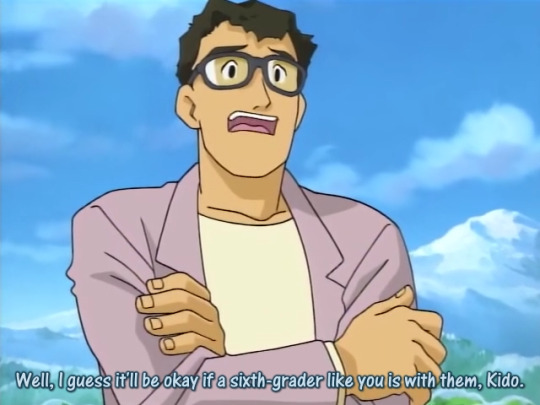
This is one of those things that’s likely to differ from the Japanese version even in dubs with scripts that are otherwise mostly close to the original, partially due to cultural differences in how this topic is approached, and partially due to the fact that nuances could still change simply due to the act of translating and recording with different voice actors and direction -- and even then, while a lot of it will still be conveyed if you watch in Japanese thanks to context and voice direction making it a bit more apparent, the nuances behind them can still be very cultural. (Even for other East Asian countries, despite the fact they have very similar seniority culture to Japan’s, there are still some differences worth noting, and likewise differences in their respective dubs.) In particularly extreme cases, this can even influence things like ship popularity or how certain characters are seen (such as the question of whether the 02 kids are well-behaved or not).
In particular, with the twelve kids in the Adventure and 02 group, since it’s a large number of kids spanning over a large age range, there is a lot going on in that complicated web of relationships that defines the many differences in how they treat each other, moreso than in other series with smaller casts. So let’s take a closer look!
Some things that are important to keep in mind in regards to seniority culture as we’re going to discuss it below:
Yes, one year in age really does make a difference. Or, at least, in this particular case, one school year (being a few months older or younger still matters, but not quite as much). The idea is that someone in a higher grade than you has done another level of schooling, and therefore is more “experienced” than you. So when the kids make a big deal about this, they’re not being pedantic, and this is why they also state their grade levels clearly in the first episodes of Adventure and 02, because they want to get on the table who’s older than whom, and therefore to set the tone for their relationships going forward.
“Politeness” is often conflated with “keeping distance and maintaining boundaries”, which means that two characters not being particularly close means they’re more likely to use respectful honorifics. It’s generally considered rude or at least very blunt to start dropping honorifics unless you’re particularly close with them (referred to as yobisute). This is also a big reason why a lot of ships that are popular in Western countries can be completely rarepair in Japanese (or even East Asian as a whole) parts of the fanbase, because their reactions are just way too distant to really read romantic chemistry out of -- not to say that it’s impossible per se, especially post-series as they get older and the age disparity means less in the long run, but the existing canonical distance and the “power imbalance” (so to speak) that the relevant kids started off with becomes an extra hurdle that needs to be taken into consideration. Conversely, some ships on the Japanese (or East Asian) end have taken off despite not really getting a huge following in the West, because it was conspicuous that the characters in question treated each other more on an equal level when they wouldn’t normally for others, but that nuance wouldn’t hit as hard elsewhere.
Communication is a two-way street! How two characters will treat each other will depend on their general personalities are, and one character might be more comfortable approaching another if said other person is very lenient about others approaching that way (which is important for characters like Taichi; see below). All in all, analyzing these requires keeping in mind each character’s background and all of the relevant factors into account, handling this on a case-by-case basis.
Okay, let’s move forward, oldest to youngest!
Jou
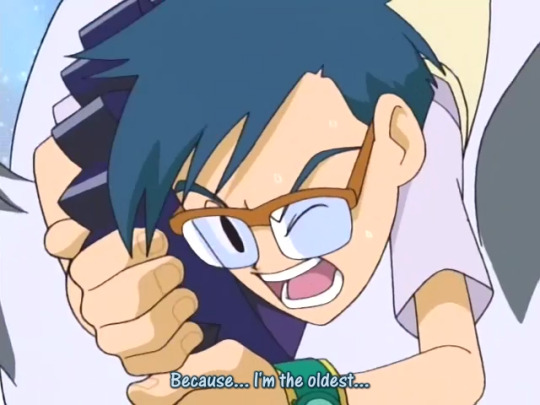
Jou being the oldest in both groups is a huge factor looming over his head in the way he treats the others throughout both Adventure and 02. As said before, one year makes a huge difference, and Jou’s really not just being pedantic -- you can see that as soon as they get back to Japan in Adventure episode 29, it’s even said outright that the kids are being allowed to be dropped off at Hikarigaoka because of Jou’s status as a sixth-grader who can take responsibility for them (yes, despite the fact there’s one year of a difference). Jou reiterates his status as the oldest because he takes his “responsibility” the most seriously -- even when they’re stranded in another world where Japanese standards of seniority culture don’t quite apply anymore. This means that every interaction Jou has with the others in the group carries a nuance that he sees the others in the sense of having them under his responsibility, and this looms over his head for the duration of both series.
Jou’s honorific pattern is interesting in that he drops them for the other boys in the Adventure group, but does not drop them for Sora and Mimi, not only because of the presumable negative implications associated with “an older boy being too blunt to younger girls”, but also because Sora and Mimi themselves are particularly polite towards him in return. On top of that, he continually opts to use “-kun” in a setting where others would use the slightly more casual and more diminuitve “-chan”, resulting in it coming off as him being very diplomatic and a bit distant towards them. (Jou only uses “-chan” with Hikari in Adventure episode 37, which is a bit more understandable since she’s an eight year old girl, and therefore a diminutive is more acceptable.) So in other words, Jou draws a clear, strong emotional boundary between himself and both of them. On the other hand, he’s casual enough to approach other boys in the Adventure group more bluntly (that the reboot’s version of Jou did not do this and used “-kun” on everyone regardless of gender was a bit of a shock for several Japanese fans used to the original version), although there seems to be enough of a distance between Jou and the 02 boys (including Takeru) in both age and closeness that he does use “-kun” for them.
One thing I’ve noticed is that Jou ships don’t tend to be particularly popular in the Japanese side of the fanbase, and while this is speculative on my part, I get the impression that it’s not because Jou is particularly disliked (in fact, it’s common for fans to endearingly call him “Jou-senpai” out of respect and adoration) as much as it’s because of the above factors -- for instance, although Jou/Mimi is popular in Western circles due to the series of events near the end of the series where he chooses to take care of her while she has her momentary breakdown, the fact that both of them are among the most adherent to their positions in the group’s seniority, plus the fact their interactions are largely very diplomatic, give off the sense that (at least at the time of Adventure) they’re too bound to their roles as senior and junior to really see each other on an equal level, and Jou does what he does for Mimi because he sees her as part of his responsibility as the group’s senior -- resulting in the ship being rarepair there to the point that might shock an average Western fan.
Interestingly, I may actually have seen more discussion of Jou/Yamato and Jou/(the girl with the bike from Diablomon Strikes Back) more often in that area than I have Jou with any of the other girls in Adventure, and my personal impression is that it’s because both of said options are less subject to the above baggage; Jou had a surprisingly emotionally frank conversation with Yamato in Adventure episode 23 that has the two come off more as equals (and Yamato has the factors of both not having initially seen Jou as much of an elder plus being someone who’s good at being responsible for himself, meaning Jou is justified in treating him this way), and someone outside the Adventure group like Bike Girl would presumably be able to get to know him without the above loaded baggage of having been a charge under Jou’s care at some point.
Taichi, Yamato, Sora
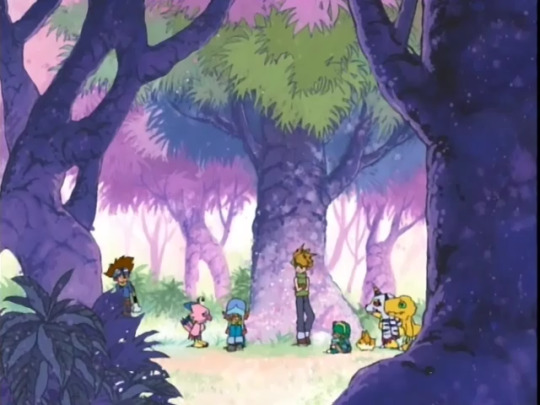
These three are basically the “middle children” of the Adventure group, and for the most part all three have more moderate relationships with the chain of command of sorts, although they have different ways of going about it.
Taichi doesn’t seem to have much care for the concept of group hierarchy in general, and the fact he treats everyone “as equals” was even mentally noted by Koushirou as a reason he took well to Taichi in particular. This means he’s quick to put people on yobisute basis -- even Jou, who’s older than him -- or use the diminutive “-chan” on characters like Mimi and Miyako. The implication is that he himself doesn’t have much respect for propriety, but he also invites everyone to be just as up-close-and-personal with him, which is why even someone like Koushirou, who’s hesitant to get close to anyone and instinctively keeps his distance, can feel more comfortable around him. (This is also presumably why Taichi ships tend to be so popular.) The reboot’s version of Taichi using “-senpai” on Jou gave a ton of Japanese fans whiplash, because Adventure’s Taichi would never.
Yamato seems to be just around as rough around the edges as Taichi, although it’s explicitly stated that his main reason for not using honorifics with Jou was that he mistook them for being in the same grade, implying that he would have if he’d realized this (and that, unfortunately, Jou had simply failed to earn his respect at first by really not coming off as a particularly respectable senior). For the most part, though, Yamato’s open to dropping the formalities if he’s comfortable around them, which is why he ends up using the diminutive “-chan” for younger girls, drops it with all the other boys (including Taichi), and apparently sees Sora as enough of an equal that he doesn’t even bother with honorifics with her right off the bat. He does briefly use “Ichijouji-kun” when discussing Ken with Iori in 02 episode 35, implying that he’ll use honorifics if there’s a certain amount of distance, but moves to “Ichijouji” in 02 episode 42 when they’ve gotten to know each other a bit better and Yamato can be more casual.
Sora, on the other hand, is much more diligent about her honorifics, using the “Jou-senpai” that her two peers won’t (therefore being more respectful about his position as elder), and being proper about her “-kun” and “-chan” for anyone younger. It does seem like she’ll drop it with people she knows particularly well, though; Taichi, whom she knew prior to the series, is on yobisute basis, and we also find in 02 episode 2 that her prior knowledge of Daisuke meant she was familiar enough with him to drop the honorific. Interestingly, Yamato -- whom she had presumably only met through the events of Adventure -- is on alternating basis between yobisute and “Yamato-kun” with her, which is the clearest expression of how she’s normally polite but will start phasing out of the honorific as she gets closer to them (which was confirmed as deliberate).
All in all, the impression is that the three of them place higher emphasis on how close they are to the other person than they do seniority and propriety, with Sora being the only one who’s more diligent about it.
Koushirou and Mimi

Sharing the spot of second lowest on the Adventure age hierarchy, Koushirou and Mimi merit special interest for two reasons: one, that these two are the most adherent to honorific propriety among the entire older group (neither of them use yobisute, ever), and two, that these are the two Adventure characters with the most noticeably drastic changes in the American English dub, to the point that this standout trait of both of their characters is completely absent there. In the Japanese version, both of them are polite to even some occasionally very strict levels, and also means both of them are very obviously conscious about their position in the hierarchy.
In the case of Koushirou, there’s strong emphasis on him “trying to maintain boundaries and distance” -- it’s said in Adventure episodes 38 and 54 that Koushirou does want to loosen up and get more casual with others, but compulsively can’t, and so the implication is that he’s too intimidated by others and too lacking in self-esteem to gather the courage to be more abrupt with people. Because of that, Koushirou adheres closely to the polite form of Japanese (you can spot this with the constant use of verb conjugations that end in “-masu”), and there’s a strong sense of strict formality and deferential respect in all of his words and actions towards others. This also manifests in times where he’s likely to be holding back his opinions because he doesn’t want to be rude. In other words, he’s shy -- and, indeed, the only person he seems to be willing to be more hands-on with with more assertive bluntness (or anything resembling it) is Taichi, who, as stated above, treated him in such a way Koushirou could be more comfortable around him. Koushirou also refrains from using “-chan”, presumably due to its diminutive and casual nature, and favors “-san” (Hikari and Mimi) or even the more diplomatic “-kun” (Miyako) instead. He’s somewhat more assertive with his juniors in 02, although he still carries himself with a bit of distant politeness.
Mimi, on the other hand, is more polite due to her upbringing, and it’s meant to portray her as having a bit of a “ladylike” personality -- in a sense, she was raised as a bit of a “spoiled princess”, so while she’s petulant about her feelings, she also treats others with consideration and politeness, and thus also has strong awareness of her position as one of the younger members of the group. (You can also see the others respond to her similarly; they’re basically treating her as the baby of the group in many ways.) There is a pretty noticeable difference in the way she treats Koushirou and the 02 kids compared to the way she treats her elders, as she very obviously holds back from stepping over boundaries with her elders (including Taichi/Yamato/Sora) and treats “Jou-senpai” with respect even when Taichi and Yamato didn’t. That said, unlike Koushirou, she does use “-chan” with Hikari and Miyako, mainly because she herself likes indulging in being cute and sweet and also acknowledging her cute little junior girls as such as well.
The fact these two are peers and the relevant nuances in that dynamic also play a huge factor as to why Koushirou/Mimi enjoys such humongous popularity in Asian fan spheres -- and why, conversely, the ship is considered a borderline crack ship in many Western arenas (especially ones heavily influenced by the American English dub, where their drastic personality changes from the Japanese version make it hard to imagine Izzy and Mimi would even give each other the time of day), to the point it often shocks a Western fan to hear that the ship is so knockout popular on the Asian side. The ship’s popularity is most likely heavily influenced by the fact Koushirou is the one Adventure group member Mimi is most obviously willing to be “hands-on” with, presumably due to his status as her peer (she won’t be likely to be too blunt with her elders, but she acts significantly more petulant around Koushirou in Adventure episode 10 and Diablomon Strikes Back). Thus, it’s easier to make a case for a ship dynamic revolving around Mimi being affectionate while Koushirou’s left at a loss for what to do due to his shyness and lack of self-esteem (or, alternatively, it just going over his head that she’s trying to get his attention because he’s too innocently dense to realize it). This is a dynamic that doesn’t work with their American English dub versions, as it’s very heavily dependent on the idea of the more bubbly Mimi reaching out to Koushirou in ways she would be unlikely to do for any of her elders.
On a related note, Taichi/Koushirou tends to enjoy slightly more popularity on the Asian end (again, especially due to the heavy changes made to Koushirou’s personality in the American English dub) due to Koushirou being obviously much closer to and more relaxed around Taichi in a way that’s very conspicuous, especially given how it compares to how he treats everyone else.
Koushirou and Mimi are also arguably portrayed as the ones who end up intimately closest to the younger ones in the 02 group, which is most likely heavily influenced by the fact they’re the ones closest to them in age.
The 02 group in general
I’m going to make a separate section here because I want to broadly touch on this before I go into specifics, but one nuance that’s easy to miss is that the 02 group is largely more deferential and respectful to elders than the Adventure group is. This might seem counterintuitive at first, due to the 02 group’s higher penchant for chaos, and especially on the part of Daisuke and Miyako -- but, in fact, they’re not willfully causing chaos even if they have rough-around-the-edges personalities, and they show almost absolute deference to their seniors’ advice and instructions, which you can tell by how they immediately soften up in their seniors’ presence, try not to incite dispute with them, and even use respectful language at times.
Overall, the 02 group is a lot more diligent about their honorifics on average (with Daisuke being the only recurring outlier). However, in practice, this is moreso due to them being more naturally well-behaved types than it is them being distant with each other -- they’re a lot emotionally closer to each other than the Adventure group was, and are thus significantly more hands-on with each other as a result. Four members (2/3) of the group are the same age, with one of the outliers (Miyako) explicitly having low awareness of her position as the oldest, and the other (Iori) holding enough of a mature demeanor that the others almost treat him as another peer, so the hierarchy is not really enforced much at all. Perhaps reflecting that, shipping within the 02 group tends to be significantly more variable and with a much larger variety of ships gaining a notable following; Daisuke, Ken, Miyako, Hikari, and Takeru all have at least three other people they’re shipped with in any consistent manner. (Iori is probably the only outlier due to his young age combined with his own personal enforcement of the hierarchy, making the relevant gap and distance too intrusive.)
The fact that the younger kids in the 02 group so obviously acknowledge the Adventure group as their elders and defer to them in such a way also contributes to why ships between a character from the older Adventure group and a character from the 02 group don’t tend to be too common on that end (and if they do show up, they usually involve Koushirou or Mimi due to the aforementioned proximity) -- not only did they have limited contact over the course of 02, the 02 kids also contribute to enforcing the power disparity (so to speak) on themselves.
The 02 quartet also noticeably uses “-senpai” for Yamato in Kizuna, and Daisuke’s up for using “-senpai” on Jou in Diablomon Strikes Back, despite the fact they don’t attend the same school at those times -- indicating that they do still afford their elders respect in terms of not only age but also experience.
Miyako

Miyako is the oldest of the 02 group, but unlike Jou before her, it seems she doesn’t have awareness of this to the point she even momentarily forgets this fact during 02 episode 7 (with her voice actress speculating that it’s because, as the youngest in her own family, Miyako’s not used to having responsibility for others). She’s also very on-and-off with her honorifics, and, like with Sora before her, it seems that she’s generally diligent about them but will drop them once she’s gotten to know someone closely enough, like recognizing Daisuke as a fellow disaster child right off the bat, or having known Iori prior to the start of the series. Otherwise, we never see her use yobisute with elders, and she uses proper “-kun” and “-chan” when she’s not up to being more in-your-face blunt with them.
Interestingly, while Miyako’s attitude of treating others without much awareness of whether they’re older or younger seems to encourage Daisuke to treat her back in kind, nobody else in the 02 group takes advantage of this, and they all use the “-san” honorific with her and seem to afford her a milder bit of extra respect as an elder -- although, unlike with the Adventure group, the line is much more blurred, presumably thanks to the 02 group having a much tighter dynamic in general. In other words, they properly consider her one of them and are willing to speak with her fairly frankly, but they also give her a bit more respect at the same time.
Miyako interestingly continues to use “-kun” for Ken throughout the later parts of the series, having originally started at the most distant level (”Ichijouji-kun”) but deliberately moving up to “Ken-kun” starting in 02 episode 25, implying that she was interested in having a closer friendship with him far earlier and more actively than Takeru/Hikari/Iori (who stay on “Ichijouji-kun” terms with him until the very end and presumably end up too habituated into it), but had concerns about being too blunt and up-front with him when he was in such a delicate position.
Takeru, Hikari, Daisuke, Ken
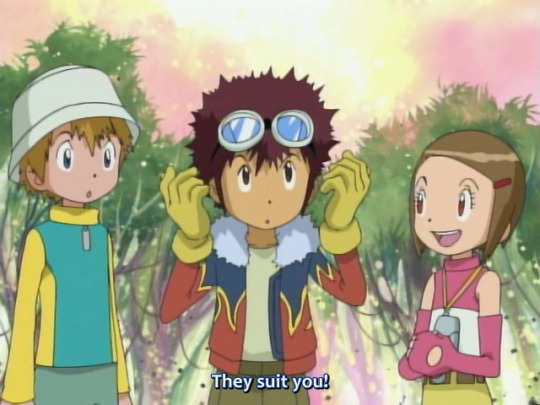

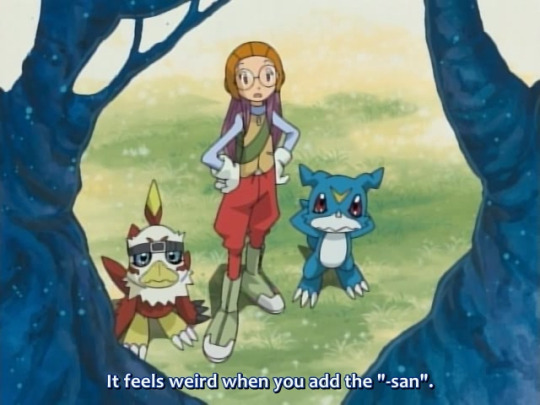
Takeru and Hikari both acted fairly deferential in Adventure, and at the time it was easily chalked up to them both being the youngest in the Adventure group by a long shot without much bargaining power in a group of elders, but once 02 comes around, it turns out they’re both fairly diligent about propriety in general, with neither of them ever using yobisute (although they’re closer to Mimi’s level in that they still use casual language, and Takeru is casual enough to use “-chan” for Hikari). That means that, yes, they’ll still use the respectful “-kun” on Daisuke despite him being the type who’s not into honorifics for anyone in the 02 group.
Daisuke really isn’t into the honorific thing when it comes to close friends, with him going for yobisute on every single member of the 02 group, including Miyako, who’s a year older than him (but she’s fine with that, considering she tells Daisuke it feels weird if he tries attaching an honorific to her name in 02 episode 30), the sole exception being “Hikari-chan” (because in this case he’s going more for the casual and endearing nuance of “-chan”). However, he is very diligent about using his “-san” and “-senpai” with all of his elders in the Adventure group, meaning his eschewing of it with Miyako is simply because he vibes with her too closely to keep her at arm’s length, and his dropping of honorifics with the rest of the 02 group isn’t because he doesn’t respect them but rather because he’s close with them, wants to stay close with them, and isn’t into formalities when trying to make friends. Daisuke also doesn’t bother with the “Ichijouji-kun” stage in talking to Ken, handling him more bluntly by starting at “Ichijouji” before eventually moving up to the more straightforward “Ken”.
Ken’s case is most interesting; he starts off diligent about his honorifics, and while he has a slightly more blunt way of talking than Takeru does on average, he also doesn’t use “-chan” with Hikari, presumably because the bad note the group started off on with him meant that he’d be overstepping his boundaries if he used such a diminutive, “cute” honorific with her at such a stage, and thus moves to the more respectful “Hikari-san”. Otherwise, he’s diligent about his “-san”/”-senpai”/”-kun”, including with the one-year-older Miyako. The only one he drops honorifics with over the course of 02 is Daisuke, who starts off by approaching him most abruptly, and so Ken starts off on “Motomiya” basis (no honorific) before eventually moving into “Daisuke” after 02, because they’re best friends and they really don’t need to have much distance at all between them anyway -- but otherwise, he strikes an interesting balance of ostensibly being more casual than Takeru yet also being conscious of respect and boundaries in terms of group hierarchy.
Iori

Iori is the youngest of the entire group of twelve, and on top of his position mandating that he treat everyone else as elders, Iori himself comes from a very formally-bound family that instilled strict manners into him, meaning that, much like Koushirou, he speaks using formal, polite language at almost all times. Unlike Koushirou, however, there’s a different nuance in why he acts the way he does; he’s doing this out of adherence to manners in trying to be a disciplined person, meaning he’s very strict with himself. (Koushirou compulsively could not get himself to speak casually, but Iori “slips” and starts speaking casually whenever he starts getting emotionally compromised.) So in other words, Iori does have self-esteem and a sense of assertiveness, but he’ll assert his opinion in the sense of “politely submitting his strongly worded opinion to the higher-ups” and, in the end, always defers to what the older kids in the group decide even if he’s firmly stated an opinion of disagreement. Even when the question of Ken joining the group becomes an issue, Iori obviously resents him, but he still adheres to honorific propriety and calls him “Ichijouji-san”, keeping his distance and making his negative opinion known but still adhering to Ken’s position as his elder.
Iori is very obviously consciously aware of his position as the youngest, and while he doesn’t resent it per se, he has somewhat of a resistance to not being allowed to pull his own weight as a peer (to the point where he protests being given everyone’s pity for it in 02 episode 16). All things considered, Iori formalizes his own position as younger than the others more than the others particularly baby him; Miyako practically treats him at eye level despite being a whole three years older than him, and even Takeru (who most obviously recognizes Iori’s need for guidance as a child) doesn’t talk down to him but rather simply adds a bit more gentleness when handling him and “bending down to speak to him at his level” to help him along.
So in other words, Iori has a strong sense of deference to his seniors in following their lead, and has strong consciousness of his position as the youngest and the other five as elders...but they in turn almost entirely afford him respect as a peer, only quietly acknowledging him as younger when it’s obvious they need to take responsibility for the fact he ultimately is younger than them whether any of them like it or not (note that nobody in the group ever refers to him as being the youngest in words, and nobody actually confirms his suspicions in 02 episode 16 that they were taking pity on him for his age). Notably, by the time of Kizuna’s drama CD, no real comment is made about the fact they’re a bunch of university-aged folks going to pick up a high school student -- just the fact their positions mean Iori will be the busiest of all of them.
131 notes
·
View notes
Text
Anonymous asked: I love your long posts which make for great reading and I wish you could do more because you’ve got such a range of astonishing interests. I’m hoping because you’ve served in the military you would have studied military thinkers. Do you think the Art of War by Sun Tzu is way overrated by everyone? I studied him a bit for my masters but I still couldn’t get my head around him. Interested to know your thoughts. Thanks!
“To lift an autumn hair is no sign of great strength; to see the sun and moon is no sign of sharp sight; to hear the noise of thunder is no sign of a quick ear." - Sun Tzu's Art of War, Chapter IV - Tactical Disposition, Clause 10.
Sounds cool, doesn’t it?
But what the hell does this quote really mean? Do you know what it means? Can anyone else tell me?
Look, I enjoy a good Sun Tzu quote as the next person. Only recently I was exchanging thoughts with a fellow blogger whose studying Thucydides, Clausewitz, and Kissinger for an advanced course at the US Naval War College. Even he prefers Sun Tzu over Clausewitz. I can see why too. If you can make sense of chapter one of Clausewitz’s tome On War you deserve a Nobel Prize.
Unlike my very learned fellow blogger, there are lot of folk who don’t know Sun Tzu at all. They can quote him, but almost certainly out of context. As someone who partly grew up in the Far East and even learned Chinese and Japanese (a pitiful but functional degree of fluency) I’m embarrassed (not hard since I’m English) when I hear other Western compatriots romanticise and elevate Eastern icons to mythic status that the Chinese themselves have never done.
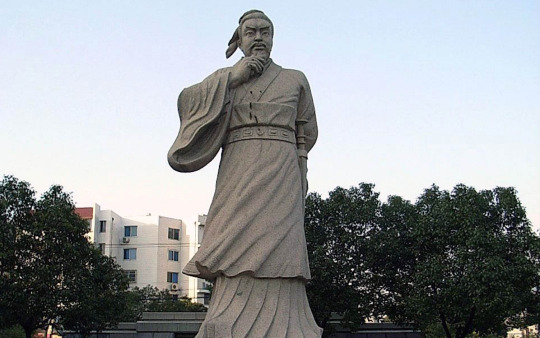
I am even more bemused than embarrassed after having hung up my military uniform for ‘civvy’ corporate clothing at how badly abused Sun Tzu’s book is in the corporate world. In my workplace I grit my teeth at corporate high flyers who mistake a balance sheet for a real battlefield by quoting Sun Tzu out of their arse, and then as self-styled ‘corporate warriors’ work themselves up in a lather of testosterone induced self-importance to crush their corporate enemies into the dust.
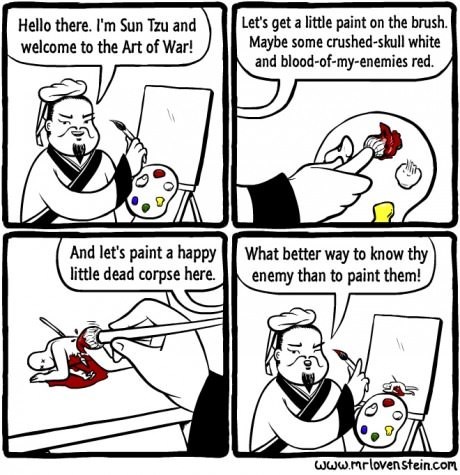
This is why the The Art of War by Sun Tzu has invited a jaundiced eye roll. And rightly so. I can see why many view Sun Tzu as over-rated because many easily impressed people go all woo woo over anything ancient and Eastern.
It’s become a familiar trope to say the art of ‘strategy’ as a science began 2,500 years ago with the writing of The Art of War. I would dispute this. Not that the writing of Art of War was the earliest written but whether I would call it a manual of strategy per se - more on this below in my answer. However you rate or overrate the Art of War it’s important to have perspective and remember this book is written in 512 BC. Other than the bible and some religious books, there are not many books that can survived thousands of years and still remains a steady bestseller and enjoys a wide influence in military academies and army staff colleges today and even as far into board rooms.
The question behind your question is just as interesting to me: why did Sun Tzu and his Art of War gain such traction in the West?
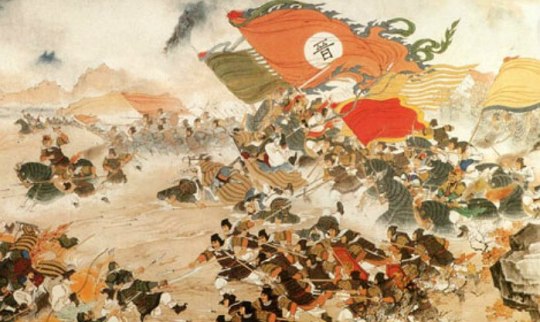
Sun Tzu (544-496 BC) wrote the original text of The Art of War shortly before 510 BC. During most of the past two thousand years, the common people in China were forbidden to read Sun Tzu's text. However, the text was preserved by China's nobility for over 2,500 years. The Chinese nobility preserved the text of The Art of War, known in Chinese as Bing-fa, even despite the famous book-burning by the first Emperor of Chi around 200 BC. The text was treasured and passed down by the Empire’s various rulers. Unfortunately, it was preserved in a variety of forms. A "complete" Chinese language version of the text wasn't available until the 1970s. Before that, there were a number of conflicting, fragmentary versions in different parts of China, passed down through 125 generations of duplication.
Indeed at the beginning of the twentieth century, there were two main textual traditions in circulation, known as the (Complete Specialist Focus) and (Military Bible) versions. There were also perhaps a dozen minor versions and both derived and unrelated works also entitled Bing-fa. Of course, every group considered (and still considers) its version the only accurate one.
When I last visited China before the Covid pandemic for work reason, I had time off to go to a couple of museums that housed the fruits of a number of archeological digs uncovering the tombs of the ancient rulers of China in which sections of Sun Tzu’s works were found. These finds have verified the historical existence of the text and the historical accuracy of various sections. I understand new finds are still being made.

The first complete, consistent Chinese version was created in Taipei in the 1970s. It was titled The Complete Version of Sun Tzu’s Art of War." It was created by the National Defence Research Investigation Office, which was a branch of Taiwan's defence department. This version compared the main textual traditions to each other and to archeological finds and compiled the most complete version possible.
This work was completed in Taiwan rather than mainland China for a number of reasons. Mainland China was still in the throws of the Maoist Cultural Revolution, which actively suppressed the study of traditional works such as Sun Tzu. The mainland had also moved to a reformed character set, while Taiwan still used the traditional character set in which the text was written. Only today is the study of Sun Tzu in mainland China growing, interestingly enough, through the translation of Sun Tzu into contemporary Mandarin. Based on the archeological sources we have today, we are reasonably certain of the historical accuracy of this compiled version that is the basis of what most people use today.
Surprisingly, the Art of War only came to light in the West around the 18th Century.
Historians believe it was first formally introduced in Europe in 1772 by the French Jesuit Joseph-Marie Amiot. It was translated at the time by the title “The thirteen articles of Sun-Tse”. Joseph-Marie Amiot (1718-1793) was not just a Jesuit priest but also an astronomer and French historian, as well as fervent missionary in China. He was one of the last survivors of the Jesuit Mission in China (he died in Beijing).

Many of the historical problems with understanding Sun Tzu's work can be trace back to its first Western translation in French. A Jesuit missionary, Father Amiot, first brought The Art of War to the West, translating it into French in 1782. Unfortunately, this translation started the tradition of mistranslating Sun Tzu's work, starting with the title, The Art of War (Art de la guerre).
This title, copied the title of a popular work by Machiavelli (a criminally underrated writer on military strategy), but it didn't reflect Sun Tzu's Bing-fa, which would be better translated as "competitive methods."
We cannot say what effect being translated by a Jesuit priest had upon the text. It was unavoidable that the work's translation reflected the military prejudices of the time era when war was both popular and Christian. It was also unavoidable that most future translations would reflect some of the first translation's prejudices. However, war was on the verge of becoming much less Christian in the West since this time was the era of the French Revolution (1789).
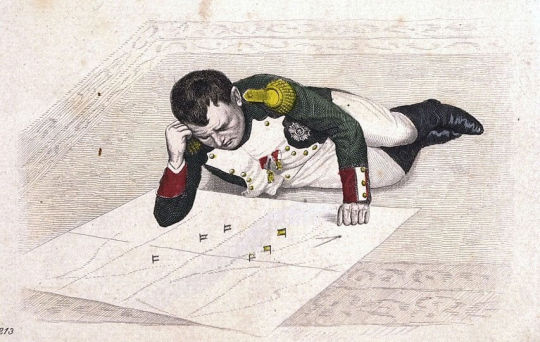
The work might well of slipped into obscurity after its initial publication, but it was discovered by a minor French military officer. After studying it, this officer rose to the head of the revolutionary French army in a surprising series of victories. The legend is that Napoleon used the work as the key to his victories in conquering all of Europe. It is said that he carried the little work with him everywhere but kept its contents secret (which would be very much in keeping with Sun Tzu's theories).
However, Napoleon must have started believing his own reviews instead of sticking with his study of Sun Tzu. His defeat at Waterloo was clearly a case of fighting on a battleground that the enemy, Wellington, knew best. Wellington’s trick at Waterloo was hiding his forces by having them lie down in the slight hollows of this hilly land. This is exactly the type of tactic Sun Tzu warns against in his discussion of terrain tactics.
After Napolean, Sun Tzu's theories made their way into western military philosophy. Many of his ideas are reflected in the ideas of work of Carl von Clausewitz. who defined military strategy as "the employment of battles to gain the end of war."
The first English translation of The Art of War is less than a hundred years old. Captain E. F. Calthrop published the first English translation in 1905. Lionel Giles, an assistant curator at the British Museum and a well-known sinologist and translator, attacked this early translation, and he published his own version in 1910. It soon began to be read alongside Clausewitz’s 8 volumes of turgid German military prose.

It wasn’t long before military thinkers were ditching Clausewitz for Sun Tzu because no one could get past Chapter One of Clausewitz’s On War. The “Clausewitz is dead, long live Sun Tzu” school was first championed by the influential British military theorist B.H. Liddell Hart in the 1920s. Basil Henry Liddell Hart (1895-1970) was a captain in the British Army. He was a very influential military theorist and historian, and author of several books such as The Future of War (1925) and Strategy (1954). Having witnessed first-hand the mechanised onslaught of the Great War, Liddell Hart sought a philosophy of warfare based in the prudent use of technology, psychology and deception - and the avoidance of the 'total war' catastrophes of preceding decades.
The main idea of Liddell Hart is to bring the set of principles of warfare in a so-called ‘indirect approach’ to the enemy. His advocacy in his scholarly work of an ‘indirect strategy’ over direct, frontal operations, was a reaction to the high casualties of the Western Front in the First World War. But his ideas were not simply about physically outmanoeuvring an opponent. Instead he pushed for a psychological scheme: to strike from unexpected directions, to generate strategic dissonance, and to induce paralysis. Hart’s well-known thoughts are “Only short-sighted soldiers underestimate the importance of psychological factors in time of war”, “Originality is the most important from all military virtues”, and “The principles of war could shortly be condensed in a single word: concentration”.
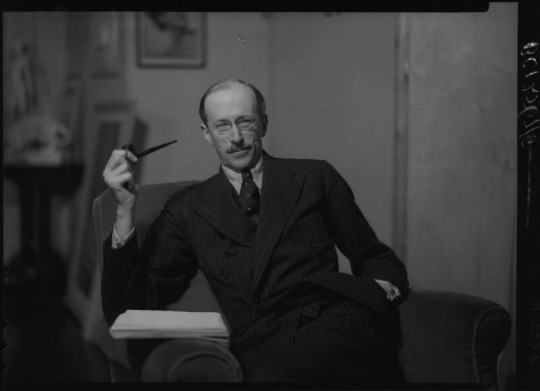
Liddell Hart believed that distilling historical insights of strategy and operations would offer the chance to avoid the costly disasters of modern war and ensure a more cost-effective route to success. He imagined technological solutions in the form of air power and mechanised land forces outflanking and shocking an enemy at the tactical level. This would be complemented by taking indirect strategic ‘ways’. Like his contemporary J.F.C. Fuller, Liddell Hart considered concentrations of air and armoured forces driving deep into enemy territory to destroy their ‘nervous system’. The psychological aspects of this were central, since acquiring an advantage demanded moves that were unexpected, with precise attacks at the most vulnerable points. As the most influential military writer of the modern age, revered and reviled by three generations of strategists, armchair and armipotent, his controversial theories of armed attack laid the foundation of the famed German Blitzkrieg.
Hart’s championing of Sun Tzu’s work as articulated through his own works got a new lease of life as the world gingerly settled into the ice bath of the Cold War. The rise of Communist China, against all the odds having defeated the well disciplined nationalist armies of Chian kai-Shek, was a wake up call for the West. There was a general befuddlement among western military analysts to explain the secret of Maoist success. There was an intellectual inquest in the 1950s and 1960s for some way to explain (and, it was hoped, learn to counter) Maoist military doctrine. Sun Tzu was seen as one of the historical and cultural sources of some particularly Chinese or Asian way of war, and his work made its way into Western discussions of counterinsurgency and asymmetric warfare.

Into the breach - and with fortuitous timing - appeared a new translation of The Art of War that was to become the defining translation right down to our day. Liddel Hart provided the foreword to Samuel Griffth’s 1963 translated copy of the Art of War. It was to quickly become a key text in US war colleges and this version is still to this day favoured by most of these institutions. We also studied Griffith’s translation at Sandhurst alongside Liddell Hart’s ideas.
There is no question that Griffith’s translation has become the standard go to translation to this day in military circles - that is until James Clavell’s more populist and looser translation came along in the 1980s. One can see why. Griffith’s translation provided a number of historical Chinese commentaries on the text. It should also be noted that Griffith’s strengths was his immense experience in the military and knowledge of military history as a brigadier general in the U.S. Marine Corps.
However, this was also his version's greatest flaw. Like many other critics I have the impression that Griffith did not really believe or understand all of Sun Tzu. Indeed he would often explain away Sun Tzu's direct statements without making it clear that this was his commentary and not what Sun Tzu wrote. The other main criticism and this one is stylistic and therefore just my opinion, Griffith was also not much of a writer. By our standards today, much of Griffith’s language can seem awkward and dated.
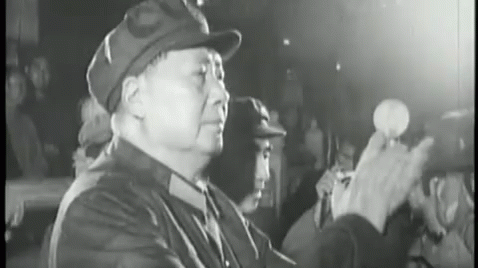
Looking back it feels ironic of the US military were wrapping their heads around Sun Tzu as way to get inside the Chinese communist mind (of Mao the military strategist especially). Unknown to them Mao had desperately tried everything to get hold of a copy of the Art of War from the Chinese Nationalists. Cambridge historian and doyenne of intelligence history, Christopher Andrew in his book The Secret World: A History of Intelligence, wrote that the theory that Sun Tzu’s The Art of War was critical to mastering contemporary warfare is propagated through the use of a tantalising anecdote: “During the civil war between Communists and the Kuomintang regime [Mao Zedong] sent aides into enemy territory to find a copy of it.” The ancient text, ostensibly, was of such vital importance that Mao was willing to risk men’s lives to obtain it, while Chiang Kai-shek vowed to protect it all costs. It’s a questionable anecdote at best as there are no historical evidence of it.
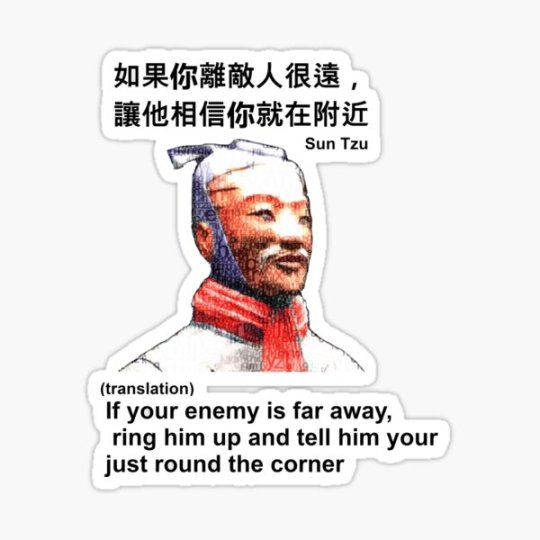
We can say that the notion that Sun Tzu’s slim treatise is considered both potent and slightly dangerous - providing the master key to unlocking victory in war through the ages - is a compelling myth that refuses to die. Mao most likely never ordered a clandestine operation to pilfer the text, nor did Chiang Kai-shek give any thought to shielding its contents from prying eyes. Both men certainly read it long before the start of their civil war, both most likely had ready access to it during the conflict, and neither man won or lost based on adherence or divergence from its teachings. But undoubtedly it set the hearts of Western military theorists aflutter in trying to unlock the secrets of Eastern military thought.
Sun Tzu and his ideas in a reincarnated form took hold of the wider public imagination in the 1980s. The 1980s was synonymous with Japan. With the perceived rise of Japan as a global economic power and the changes in post-Mao China, there was a Western (meaning American) search for more explanations. What was the secret of Asia’s rise? How were Japan and China ‘doing’ this?
In Western business circles it was for a time trendy to read it because of the perception that it was part of what made Japanese businesses so successful during the 70s and 80s. Management gurus and other corporate consultants certainly latched on to it and touted it as a way for Western businesses to re-orient their entire management and business philosophy. I don’t know if that ever actually was the case in Japan - my father who worked in both China and Japan in the corporate world at a very senior level said it wasn’t - but what is true is that in the West as the Japanese economy languished into the lost decade of the 90s so too did interest in Japanese business practices, and thus Sun Tzu.

The idea that The Art of War was a kind of how-to guide to ‘strategy’ was made especially popular by Hollywood in the 1980s. Oliver Stone’s iconic film ‘Wall Street’ seemed to typify the ‘greed is good’ New York capitalist scene of the 80s and 90s. Hollywood mirror imaged the rise of the corporate raiders and junk bond kings like Ivan Boesky and Michael Milken. Hollywood sent thousands of American businessmen off to read Sun Tzu to look for ‘leadership secrets’. This is part of a general Western fascination with ‘timeless Asian wisdom’, the American idea that ‘the mysterious East’ is possessed of secret knowledge. American and European businessmen were enamoured of the idea that “a battle is won or lost before it ever begins”, a saying that reinforced traditional American business attitudes about a winning mentality and a ‘can-do’ spirit being two keys to success.
Because Japan and China were trendy in the 1980s and 1990s it also influenced Western popular culture, not just fashion (think Kenzo) but also comic books (manga) and anime. In this Eastern friendly climate it led a number of popular fiction authors to release their ‘own’ versions of the work to capitalise on its newfound popularity. These versions were more about the pop culture of the era than Sun Tzu. Unfortunately, though popular, none of these versions took advantage of the work completed in Taiwan creating a definitive version of Sun Tzu's text by this time. These versions were based either on old English translations (the Calthorp and Giles versions) or incomplete Chinese sources. However, all of these versions remain popular today, despite their questionable sources and poor quality of translation.

In 1983, James Clavell updated The Art of War translation of Lionel Giles and published it in a very popular version. This started a very common practice in English translation: creating a ‘new’ version from other English translations instead of going back to the original source. Authors today continue to follow this practice, which only perpetuates and exaggerates the problems with early translations.
Thomas Cleary, another well-known author, did his own The Art of War translation with historical commentary in 1988. Again, his name recognition did much to increase awareness of Sun Tzu, even if his work did nothing to improve the general quality of the translation.
Looking back the whole Sun Tzu as a business model fetish in the 1980-90s was really pretty silly, rather like 80s shoulder pads. Of course, there are some similarities in leadership regardless of profession, but the basic goals and working environments of war and of business are so wildly different that applying Sun Tzu to business is superficial at best.
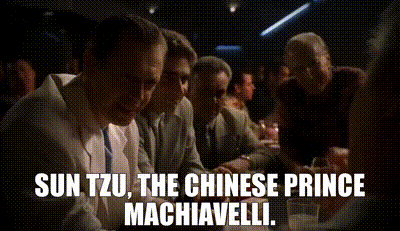
So to me the problem is not that Sun Tzu is ‘overrated’ per se, the problem is that every half baked author out there try to apply its principles to every problems that mankind have. The Art of War, as the title suggest, is not The Art of Managing your Business, the Art of Winning in Competition against your classmates, The Art of picking up Women, The Art of Living Life to the fullest. It is, and only is, The Art of War. It is ‘overrated’ only if you expect it to answer every problems in your life.
The Art of War is not the word of God. It is a war manual advocating common sense with pithy aphorisms - and a very good one.
It’s not that I think the Art of War is over-rated it’s that the more common problem is that many people vastly under-rate Sun Tzu. By misreading Sun Tzu thoughts and ideas, I believe many are in effect under-rating the problems which Sun Tzu is addressing, namely war, or the continuum of conflict resolution where divergence in interests of multiple parties extends to the possible use of lethal force on a massive scale. A lot of people trivialise this problem with idiocies like “what if someone threw a war and nobody came” (clue, they would win, then hunt down and enslave or kill everyone too foolish to contest the issue, as has happened countless times in human history) or “ban war” (said ban apparently enforced by throwing flowers at soldiers).
Understanding that war is a very real and intractable problem is necessary to fully appreciate the genius of Sun Tzu’s work, especially where it avoids fixed and easily definable tactics specific to the Warring States period and instead illustrates timeless concepts of out-thinking the enemy at every level of conflict. That the text is still mostly readily applicable or at least reasonably insightful after thousands of years is a testament to the inability of humans to push warfare beyond the fundamental aspects of conflicting interests and continuum of forcible resolution Sun Tzu addresses.

Still, the particular translation matters far less than having an appreciation that, in war, you have an active opponent who is trying to out-think and counter any moves you make, and having an appreciation of non-dualistic philosophical reasoning more characteristic of Chinese classics generally. The classic symbol of Yin-Yang (and a number of derivative versions) illustrates apparent dualism as being a part of a deeper structural unity which does not permit a fixed division into separate parts.
Hence the difficulty of applying the principles of the Art of War to artificial ideas of “winning/losing” (or war/peace, right/wrong, us/them) as categorical absolutes rather than negotiated possibilities in a continuum of desirability/costs. And it is very difficult, no one should sugar coat that. Humans sort and construct their perceptions of reality by appeal to such gross simplifications. Binary logic is an immensely powerful tool in many areas because it leverages the ability to simplify complexity and then build valid inferences based on fixed premises. But at some point you have to go beyond that to have a more fluid response to reality as it is. Which Sun Tzu does for the reality of war.
I would recommend anyone to read it. At the end of the day it’s a book of highly general aphorisms that effectively synopsise the essential insights that apply to all kinds of human conflicts. Turning an enemy's flank has the exact same effect in 2500 B.C. and in 2000 C.E. and it has the same effect in the boardroom, or public market as it does on the battlefield. Deception and intelligence are still used in exactly the same way, whether conquering foreign lands, or stealing market share from a competitor. It's a book about common sense; but common sense must seem profound to those who have none.
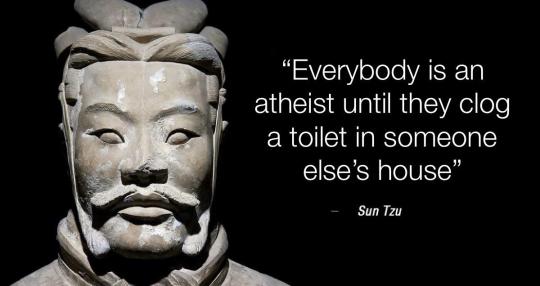
Overall, I think Sun Tzu’s Art of War is a worthy read and not overrated because in our society of over educated achievers, common sense is in as short of supply as it has ever been; if this book can provide the meaningful framework for educating very bright people in down to earth common sense, that can only be a good thing.
The value of the book then is to drive home the fact that, in human conflict, there really is Nothing New Under the Sun (Tzu).
Pardon the pun and thanks for your question.
#question#ask#sun tzu#military history#book#philosophy#china#culture#the art of war#war#military#warfare#strategy#society#literature#america#britain#japan
568 notes
·
View notes
Note
Not to stir the pot or anything but I’ve been seeing so many posts on tumblr of some group that is posting “another translation” of Saezuru. These people keep talking about demanding that the publishers re-release a “perfect” translation. As a former JA>EN translator I have my own thoughts on this one but I was curious to know what you thought. (Also, I’d love to know more about what kind of translation work you do!)
Sigh. I don't even have to look up that blog to know who you're talking about. And I think "another translation" is a very fitting term for what they do. ;) From what I saw, they're a prime example of the Dunning-Kruger-Effect. If translation were as simple as exchanging words from the source language into their dictionary translation of the target language like a robot, there wouldn't be tons of books on translation theory out there. I feel a rant coming up, so please bear with me, because what I’m about to say will be nothing new to you.
First of all, there is no "perfect translation". Give the same source text to ten translators and you'll get ten different results. All of which can be perfectly valid. Ideally they all convey the same meaning, so it's not like you wouldn't notice that they were translated from the same source text. But the wording will differ. One person will find a better translation here, another person will find a better way to phrase things there. It's not like one translator gets everything right and better than everyone else, unless you have people with vastly different skill levels. Often it will be simply a matter of personal preference which translation you like best.
The person who runs the blog you mention has a very literal approach to translation. They think sticking as closely as possible to the phrasing the author chose will achieve the "perfect result". But that's a typical beginner’s mistake. They're getting the facts right, I'll give them that. Being a native speaker does have advantages. But getting the facts right is the bare minimum we try to do as translators. (I say "try", because we're human and everyone makes mistakes here and there.) What's more important for a good translation is strong writing skills in your target language, which is why most professional translators translate into their native language, not from their mother tongue into their second or third language. Because it's incredibly hard to develop the same feel for what sounds good and natural in a language you didn't grow up with. It's not impossible, but very few people achieve this level of skill.
I'm also an ESL speaker, so I won't judge other people's English, but let me explain why I think that translating too literally is a beginner's mistake. First of all "literal translation" is a total myth, because where you draw the line between what is “literal” and what is not is always a deliberate decision made by the translator. Strictly speaking, if someone claims to be using only Sensei's own words, they would also have to drop subjects and pronouns where they're missing in the Japanese original, as they do all the time. I doubt anyone would go this far, but let's roll with this example to emphasize my point:
"iku?" (Go?) is a perfectly natural thing to say in Japanese. The info who is going and where they want to go is usually clear from the context and doesn’t need to be explicitly stated. So the Japanese reader gets a normal sentence, whereas the English reader gets an ungrammatical one. The sentence needs a subject at least: "We go?" Understandable English, but still not a grammtical sentence. "Should we go?" Now we get the same information the Japanese speaker got from just "iku?" in the context I pretend it was said in. I added two words that aren't there in the original, yet my sentence is a) easier to understand b) correct English and c) conveys the same meaning as the original, while the "literal translation" is lacking in all three aspects. Now please imagine a whole text written like: “Go?” “Yes, go!” Would you honestly think that the translator did a good job by giving you a text in broken English that's barely understandable when things get more complex than this? The Japanese audience gets a perfectly well-written story, while you’re barely even able to understand what’s going on. So your reading experience doesn't match at all, despite sticking religiously to the source text.
I’m exaggerating of course. No translator would go this far. But this example shows that even the most “literal translation” doesn’t get away with wording things exactly as in the source text.
And then we get into more complex territory: If I translate a joke, is it more important that I give you the exact words the author used, although you're missing the cultural context to find the joke funny, or is it more important that I make you laugh like the author intended? If there's a dialect, how do I go about it? Is it important enough to risk alienating my audience (because we're not really used to seeing written dialect)? If yes, which English dialect could work? There is never a perfect equivalent, because dialects are so tied to the region where they're spoken. So do I substitue a Japanese southern dialect with an English southern dialect? Or do I go by the image the dialect evokes in the Japanese reader’s head? Urban or rural? Or maybe I should create a fictional dialect? But then it doesn't evoke any image at all and might simply sound stupid. Or how do I "literally" translate all the different ways to say "I" and "you" in Japanese? There is simply no one and perfect way to translate something. Some ways are objectively better than others, but most of the time it's a case by case decision. What works well in one situation, might be the wrong approach in another one.
So if you try to approach everything with "literal is best", your result won't even be good. You’ll end up with awkward English: flat dialogues that don’t flow, clumsy idioms, unnatural word choices, characters who don't sound like native speakers, jokes that don't land, shifted nuances, weird sentence structure and so on. All this makes the text harder to read, harder to understand and almost impossible to enjoy. If you can’t create a text that reads as effortlessly and beautifully in English as it does in Japanese, all you’re doing is make the author look unskilled (and yourself too ofc).
Proper translation aims to recreate the unique features of each source text and the individual style of the author with the natural means of the target language. You’re allowed to be creative and find original ways to do so, but you're not supposed to cripple the target language by pressing it into the structure of the source language. Because the readers don’t see “the beauty of the Japanese language” in your supposedly faithful translation. They see clumsy or even wrong English.
Coming back to the "another translation" blog. If we're talking about the same person, they like to label everything as "serious mistranslation". Yes, there are many actual mistakes in the scanlation, and probably in the official translation too (I haven’t read it tbh), but 90 % of the things I saw them point out aren't even minor mistakes. They're just "correcting" perfectly natural English into English that says exactly the same, just worse or longer. Speech balloons have limited space and sometimes a sentence simply doesn’t fit in if you don’t shorten it a little. That’s not a mistake! And if I have a Japanese sentence like "I'm doing this for the first time", it's not a mistranslation to turn it into "I've never done this before", because the meaning is exactly the same. I just chose a phrasing that might sound more natural in English in the given context. This is a made-up example, but this is the level of nitpickery we're talking about. Not to mention that it's incredibly rude to drag someone else's translation publicly like that, especially when your criticism is solely based on your own lack of knowlege.
(Regarding your last question: I translate manga professionally but that’s all I can really say on this blog.)
85 notes
·
View notes
Note
May I please ask what your preferred dynamic between Holmes & Lupin would be? (From what I can tell, the term 'frenemies' might have been invented for these two - if any two characters in fiction WOULD spend all their time trying to one-up each other it's these two, if only their diverse other commitments, challenges & interests left them the free time to do so: I'm also morally certain a sadly-hypothetical Holmes/Lupin team is one of the few things that could bring down Fantomas for Good).
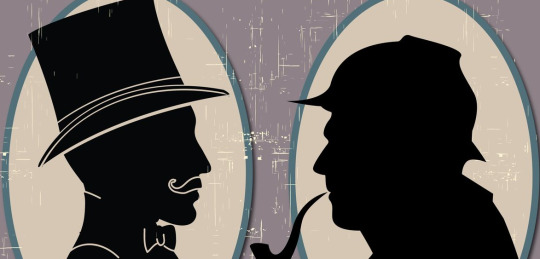
I think "frenemies" is what ultimately works best for these two specifically, because there's a certain untouchability to icons as big as these two that limits the potential stories you can tell with them (although yes, definitely on board with the two having what it takes to bring down Fantomas, although probably not as cleanly and easily as they might expect).
The original Leblanc stories involving this premise are very much centered around one-upmanship, even embracing a theme of national rivalry of England vs France. They acknowledge Holmes's talents but without the awe, with a somewhat aged Holmes with mundane imperfections easily exploited by the daring young thief, someone deserving of his legend but who doesn't quite live up to it. Obviously Lupin's gotta have the upperhand, not just because it's his author writing it, but because the whole point of Lupin's creation was to be the new hotness, the counterpart to both the stuffy old Great Detectives as well as the aristocratic master burglars, and really, what kind of rising superstar would he be if he couldn't put one over the other guy? If he's gonna live up to his claim of being the greatest criminal ever, he's gotta be able to humble the greatest detective at least a little.
The treatment of Watson (Wilson) is tasteless and it's frankly a bit saddening to see that even back then writers were still shitting on Watson far too much, but on the whole I think Leblanc was a lot fairer to Holmes than he could have been (certainly other writers from this time period who added Holmes to their stories were not as fair), he makes it very clear Holmes is not just another Ganimard out of his depth and is very much as close to an equal Lupin's ever had. I think the description used to cap off their final meeting is very much on point:
"You see, monsieur, whatever we may do, we will never be on the same side. You are on one side of the fence; I am on the other. We can exchange greetings, shake hands, converse a moment, but the fence is always there.
You will remain Herlock Sholmes, detective, and I, Arsène Lupin, gentleman-burglar. And Herlock Sholmes will ever obey, more or less spontaneously, with more or less propriety, his instinct as a detective, which is to pursue the burglar and run him down, if possible.
And Arsène Lupin, in obedience to his burglarious instinct, will always be occupied in avoiding the reach of the detective, and making sport of the detective, if he can do it. And, this time, he can do it" - Arsene Lupin vs Herlock Sholmes
The consistent outcome is that Holmes "wins" the material battle while Lupin gets away with the spiritual or karmic victory. The first story, Holmes has Lupin figured out from a glance, robbing him of his greatest asset, and Lupin even tells Holmes under a guise that he has no greater admirer than himself. Holmes choses not to arrest Lupin, and instead solves the mystery as quickly as Lupin would. But he is also, well, inferior. His "commonplace appearence" dissappoints the guests and detectives at the crime scene, he doesn't resemble their expectations, he is gruff, ungracious, arrogant and all-business, an Englishman all the way, and Lupin one-ups him by returning to him his stolen watch, and Holmes is not a good sport about it.
The whole "Herlock Sholmes" name change, although it was out of legal obligation, almost reads like a cheeky courtesy of Leblanc, like he's giving Holmes enough of a courtesy in sparing him the embarassment of being the loser. And the following adventures stay consistent: Sholmes is smart, as smart as Lupin, and he's a gentleman. But he isn't as smart as he thinks he is, and he isn't as much of a gentleman as Lupin. He resorts to unsporting tactics like intimidating Lupin's lover and involving the police in their conflict, and in the end, he's solved the crime, but "sown the seeds of discord" in a family Lupin was protecting, becoming the villain for a change, a role reversion Lupin openly laughs at. Holmes wins the "loot", he wins the material battle, but Lupin has the last laugh, and despite being a self-proclaimed villain, Lupin gets the moral victory.
It's a quite unflattering view of Holmes and one perhaps not suited for a crossover outside of the specific context of Holmes being the old and stuffy intruder in an Arsene Lupin story. Then again, every great hero needs a lesson in humility every now and then.
There's a particularly interesting variant of this dynamic to be found within China's own takes on Sherlock Holmes and Arsene Lupin.
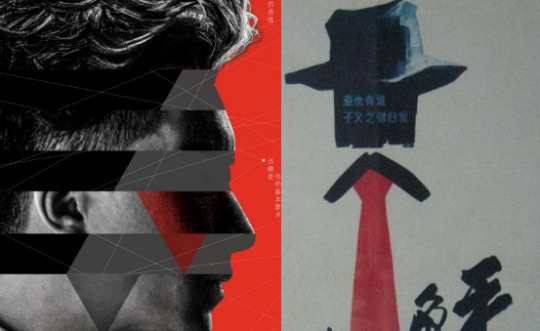
Sherlock Holmes was quite the breakout hit for Chinese audiences at the time of his release, revered as an alternative to Judge Bao and the court-case novels. It's estimated that from 1903 to 1909, detective fiction constituted over almost 50% percent of all Western translated fiction, and with Holmes followed others like Nick Carter and Charlie Chan, and then Arsene Lupin, and soon their own local versions. The most famous and popular of which was Huo Sang, created by Cheng Xiaoqing, who was one of the main translators for Conan Doyle's stories. Cheng Xiaoqing even wrote his own take on Sherlock Holmes vs Arsene Lupin called "The Diamond Necklace", intending on correcting Leblanc's take, although interestingly, he unintentionally recreates the exact outcome by giving Holmes an unsporting attitude, where he "wins" only because Lupin lets him, and Lupin gets away again with the moral high ground. He would fare off much better in correcting Holmes with his own character, Huo Sang.
Huo Sang has a lot of similarities to Holmes, even with his own Watson counterpart, but was also designed to represent a few more traditional Chinese values. He is a science teacher with no addictions who belittles the wealthy class and fights for the poor, and he is praised for humility, one story even making a point to criticize Holmes for arrogance. He is a very Westernized character, with suits and guns and cigarettes galore, but the books were very dictatic and the author marketed them as "disguised textbooks for science", playing up on a newfound social reverence to scientific methods and self-improvement and national rejuvenation.
The stories deal heavily with corruption of the police force and institutions. In the earlier stories he outright calls police detectives useless rice buckets only good for solving petty thefts and preying on those that can't defend themselves, and while they become less sinister in later stories, Huo Sang's relation with law enforcement is much more frayed than Holmes's own. He uses dirty police tactics of his own and sometimes takes the law into his own hands, thinking the law cannot possibly achieve justice on it's own. His biggest loyalty is to his country and he values his reputation above all else. He values justice more than the law, like Holmes. But like Holmes, he still prefers to work inside the law and within Chinese traditions.
"Bao Lang, you scholar, you're too idealistic. Don't you realize how weak the law is in modern society? Privilege and power, favors and money - the law has all these deadly enemies
"We investigate half to slake our thirst for knowledge, half out of duty to serve and uphold justice. In the realm of justice, we are never constrained by the wooden and unfeeling law. For in this society, which is gradually tending to surrender its core to material things, the spirit of the rule of law cannot be put into general practice, and the weak and ordinary people are aggrieved, more often than not unable to enjoy the protection of the law.

Lu Ping, as you'd expect from a counterpart to Lupin, was much different. In fact, right in his very first story, he was already pitted against Huo Sang and outsmarting him, in a story called "Wooden Puppet Play". The character is inspired by an already existing tradition within Chinese literature of the "chivalrous thief", shapeshifting masters of deception and martial arts, and considered admirable and benevolent opposite to the corrupt government officials they outwit.
His stories are more whimsical, energized, more varied, less dedicated to strict science. He whistles while committing crimes, is identifiable by a red tie and wooden puppets he uses to signal his goons on what outfit he's gonna be wearing, and even cracks asides to the reader. In many aspects Lu Ping is influenced by hard-boiled Western detective stories, and naturally, he has a much more contemptious view of the law than Huo Sang
Well then, was he willing, in his capacity as thief, to represent the sanctity of the law and catch the murderer? Yes, he would be quite happy to round up that murderer. But he wasn't at all willing to boost the reputation of the law. He'd always felt that the law was only something like an amulet that certain smart guys had fabricated to get them out of embarassing situations.
Such an amulet migh be good for scaring away idiots, but it oculdn't threaten the violent, crafty and arrogant evil ones. Not only could it not scare them away, a lot of them hid right behind it to work their evil tricks!
Conflicts between these two are not just rooted in one-upsmanship or the patriotic conflict between the two, but instead in two differing approaches to justice, their influence on fellow Chinese writers to step outside tradition, and the respective ways they address issues in society. Additionally, it's not just a conflict between Great Detective vs Gentleman Villain, but the Holmesian Detective and the Hardboiled Detective. And, naturally, when the two met, a pattern reocurred again.
Writing a Lu Ping tale in his usual manner, Sun Liaohong deprives the detective of the advantage he typically enjoys at the hand of Cheng Xiaoqing or any other follower of Conan Doyle - narration by the detective's coadjutor.
It is Huo Sang who slinks around like a thief, alarming hotel service personnel. He becomes rattled, and even so is vain and arrogant. He is a bit too positivist about searching for clues, and he spends a remarkable amount of time just relaxing and waiting for something to happen.
The figure of "wooden puppets" turns wicked when the author uses the term to refer to Huo Sang, Bao Lang, and the police. Satirizing the genre as a play in which the author woodenly manipulates his character. But Lu Ping as puppet is a genius, moving from one identity to another, whereas Huo Sang is a dumbbell - wooden indeed, bourgeois, ridiculed.
A gentleman's agreement occurs only at the end. Huo Sang has the formal victory. He frees Lu Ping in order to get the paining, but the exhibition is held a day late and it now bears Lu Ping's seal.
In wartime, peace talks, diplomacy and gentlemen's agreements are just smoke screens, the stuff of puppetry. Both Huo Sang and Lu Ping surround themselves with lies to reach their final accomodation. Perhaps they are both puppets - Chinese Justice, the Fiction: Law and Literature in Modern China, by Jeffrey C. Kinkley
Both characters were canned in 1949 when the CCP banned detective fiction, and it was replaced with anti-spy literature about how the party police would expose counterrevolutionary conspiracies. They never got to have a rematch, and to my understanding there were a couple of films made afterwards about them, Huo Sang had a very recent one in 2019, but never another meeting.
I guess the takeaway here time and time again is that, credit to Holmes and all, but:

#replies tag#pulp heroes#pulp fiction#sherlock holmes#herlock sholmes#arthur conan doyle#arsene lupin#maurice leblanc#lupinchads can't stop winning
91 notes
·
View notes
Note
I think we should start a protection squad (although they don’t need it because they can protect themselves) for Sun Wukong and Guanyin
“Begone monkie kid fandom trying to down grade these really interesting characters with interesting personality’s and backstory ( the both of them like seriously Guanyin backstory is so cool) to a villain wile trying to justify your angsty backstory (that are no where near as cool as monkey who fights gods and Person who has 1000 arms and heads to help people in need) for the actual villain”
So who wants to join
Me:*raises my hand*
Ps: sorry if I got Guanyin backstory wrong am not an expert on it.
Haha okay so some critiques on the jttw & associated media western fandom & fandom in general coming up, so please skip this upcoming text wall if you don't want to encounter my undoubtedly ~devastating~ words (i.e. don't like don't read as people love to say, & if I have to be inundated with images of my notp every time I go into the sun wukong tag then I imagine people can be chill with me expressing my opinions & giving people fair warning that I WILL be critiquing common fandom trends, but no need for you to see that if you don’t want to. Cool? Cool.)
-----
PFFFFFTTT oh man there are many times when I feel like signing up for such a protection squad...when it comes to the current western jttw & Sun Wukong fandom I do feel like I'm often swinging at a rapid pace between "well it's fandom & people are allowed to make the stories they want" & "I am once again begging my fellow monkie kid enthusiasts (& sometimes creators) to do more research into the og classic/show it more respect so you can avoid any potentially offensive/off-the-mark misunderstandings of the status & cultural context of the characters in their country of origin (I promise it's super interesting & I can provide you with links to free pdf copies of the entire Yu translation, i.e. the best one ever created, so feel free to ask!) & maybe also stop constantly stripping away all the nuance of Sun Wukong's character for the sake of either making him an entire asshole so your little meow meow can look completely innocent in comparison and/or making the monkey king's entire life & character revolve around said meow meow."
Like I get that fandom's supposed to be a kind of anything-goes environment, but one thing that honestly seems to be true of a lot of fandoms--and the western one for Sun Wukong & co. is certainly not immune from this--is that there often seems to be a kind of monoculturalization at work in what stories are created & what character interpretations are made popular. Across a multitude of fandoms, you frequently see basically nothing but the exact same tropes being made popular & even being insisted on for the canonical work (especially hasty redemption arcs & enemies to lovers these days), the exact same one-dimensional character types that characters from an original work keep getting shoved into, the exact same story beats, etc. And I get it to an extent, as fandom is generally a space where people just make art and fic for fun & without thinking too hard about it & without any pressure.
This seems to, however, often unfortunately lead to the mentality that it’s your god-given right to do literally whatever you want with literally any cultural figure without even the slightest bit of thought put into their cultural, historical, and even religious context, even (and sometimes especially) when it comes to figures that are really important in a culture outside your own. For such figures--even if you first encounter them in a children’s cartoon--you should be a little more careful with what you do with them than you would with your usual Saturday morning line-up. It of course has to be acknowledged that there exists a whole pile of absolutely ridiculous & cursed pieces of media that are based on Journey to the West & that were produced in mainland China, but for your own education if nothing else I consider it good practice for those of us (myself certainly included) who aren’t part of the culture that produced JTTW to put more thought into how we might want to portray these characters so that at the very least (to pull some things I’ve seen from the jttw western fandom) we’re not turning a goddess of mercy into an evil figure for the sake of Angst(TM), or relegating other important literary figures into the positions of offensive stereotypes, or making broad claims about the source text & original characterizations of various figures that are blatantly untrue, or mocking heavenly deities because of what’s actually your misunderstanding of how immortality works according to Daoist beliefs. Yet while a lot of this is often due to people not even trying to understand the context these figures are coming from, I do want to acknowledge that the journey (lol reference) to understand even a fraction of the original cultural context can be a daunting one, especially since, as I’ve mentioned before, it can be really hard & even next to impossible to find good, accessible, & legitimate explanations in English of how, for example, the relationship between Sun Wukong and the Six-Eared Macaque is commonly interpreted in China & according to the Buddhist beliefs that define the original work.
That is to say, I do think it’s an unfortunate, if unavoidable, part of any introduction of an original text into a culture foreign to its own for there to be sometimes a significant amount of misinterpretation, mistranslations, and false assumptions. There is, however, a big difference between learning from your honest mistakes, & doubling down on them while dismissing all criticism of your misinterpretation into that abstract category of “fandom drama.” The latter attitude is kind of shitty at best and horrifically entitled at worst.
Plus, as I’ve discovered, there is a great deal of interest and joy to be drawn from keeping yourself open to learning aspects of these texts & figures that you weren’t aware of! I can say from my own experience that I’ve always really enjoyed & appreciated it when individuals on this site who come from a Chinese background--and who know much more about the cultural context of JTTW than me--have taken the time to explain its various aspects. It often leaves me feeling like woooooaaaahhhhhHHH!!!! as to how amazingly full of nuanced meaning JTTW is like dang no wonder it’s one of China’s Four Great Classical Novels.
And I guess that right there is the heart of a lot of my own personal frustration and disappointment with the ways that fandoms often approach a literary work or other piece of media...like don’t get me wrong, a lot of the original works a fandom may grow around are just straight-up goofy & everyone’s aware of it & has fun with it, yet the trend of approaching what are often nuanced and multi-layered works in terms of how well they fit and/or can be shoved into pretty cliche ideas of Redemption Arc or Enemies to Lovers or Hero Actually Bad, Villain Actually Good etc...well, it just seems to cheapen and even erase even the possibility of understanding the wonderful complexity or even endearing simplicity that made these works so beloved in the first place. Again, I feel like I need to make it clear that I’m not saying fandom should be a space where people are constantly trying to one-up each other with their hot takes in literary analysis, but it would be nice and even beneficial to allow room for commentary that strives to approach these works in a multi-faceted way, analysis & interpretations that go against the popular fandom beliefs, & criticism of the work or even of fandom trends (yes it is in fact possible to legitimately love something but still be critical of its aspects) instead of immediately attacking people who try to engage in such as just being haters who don’t want anyone to have fun ever (X_X).
----
Anyway, I know I didn’t cover even half of the stuff you brought up in the first place anon, but I don’t want any interested parties to this post to suffer too long through my text wall lol. I was asked to try my hand at illustrating Guanyin, but as with you I’m nowhere near as informed as I should be about her, so I want to do more research on her history and religious importance before I attempt a portrait. I’ll try my best, and do plan to pair that illustration with my own outsider’s attempt to summarize her character. From what little I do know I am in full agreement that her backstory is so incredibly amazing...just the fact that she literally eschewed the bliss of Nirvana to help all beings reach it, and even split herself into pieces in the attempt to do so (with Buddha granting her eleven heads and a thousand arms as a result)...man, I can see why she’s such a beloved & respected deity.
----
As for what western fandom commonly does with everyone’s favorite god-fighting primate...I can talk about this at length if there’s interest, but for this post I’ll just say that I guess one lesson from all of this is that for all the centuries that have passed since Journey to the West was first completed, literally no one drawing inspiration from the original tale in the west (lol) has come even slightly close to being able to equal or even capture half the extent of the nuance, complexity, religious, historical, and cultural aspects, and humor that define Wu Cheng'en's story of an overpowered monkey who defied even Buddha.
So thank the heavens we'll always have the original.
36 notes
·
View notes
Text
Why Ricciardo doesn't want McLaren struggles to leave him 'resenting' F1
With one absolutely at the top of his game and overachieving every weekend, the other has been left perplexed by his struggles to adapt to the car.
It also means that on days Ricciardo feels he has done well, like his charge to seventh in the Austrian Grand Prix, it is all overshadowed by what his teammate has done.
As a team player, Ricciardo is obviously pleased to see Norris make progress and benchmark the MCL35M.
But it’s not making his life any easier as the world at large questions his form. Indeed he’s decided that he has to not be overly concerned about his young teammate’s pace.
“I feel like it's obviously for whatever reason been a very unexpected and difficult season so far, just from a pace point of view,” he told Motorsport.com after the Austrian race.
“And I guess the easiest way for me to kind of move forward is to accept that. Did I expect more? Absolutely. But I think if I every weekend go into it now expecting to be quicker than Lando, or whatever it is, I'm probably just going to end up resenting the sport, because clearly it's going to take a bit more.
“Clearly there's something that is missing. I feel good in the car, especially the last three weeks, it's felt better.
“I don't want to say, what's the word, wave the white flag, or succumb to whatever it is, I'm just going to not really focus or lose too much energy on that, and just accept that he's driving very well. The aim is to obviously get closer, and help the team out as well.”
In other words, he just has to focus on what he’s doing: “I think that's it, you can get lost obviously with other things. And maybe that's the wise kind of 32-year-old in me now. But I think I've just got to focus on myself, and then hopefully, I can keep chipping away at it.”
Around the time of Monaco and Baku Ricciardo acknowledged that the upcoming triple header at “normal” circuits, with two races at the same venue, would be a huge opportunity for him to learn more about how to get the best out of the car.
His French GP weekend was solid, 10th on the grid followed by sixth in the race, some 11.8s seconds behind Norris at the flag. He started 13th at the Styrian GP and had a typically good first lap to get up to eighth. Decent points appeared to be possible, but an early engine glitch cost him four places and saw him ultimately cross the line where he qualified, in 13th.
In that context the Austrian race represented a step forward, and at least he was able to fight.
“Yeah, it was better,” he said. “I think it was just the day I needed. And for sure I would say for the team, the points, it was nice to get in seventh and get points for them.
“But I mean personally, right now obviously I'm not in a championship fight, so the points are, I don't want to say irrelevant, but I think the important thing for me was just have fun, be in some battles, and put myself in a good position.
“And that's what I did, and the end result was some points, which is nice. I just enjoyed it. Obviously it's been hard to fully enjoy it when the results have not been there, so I took a bit more fulfilment from from the race.”
Ricciardo is still getting those first laps right. He passed George Russell and Carlos Sainz at the original start, and then Sergio Perez (who went through the gravel) and Charles Leclerc after the early safety car.
“I don't know if it's I'm getting old, but the first laps are a blur!,” he smiled. “I remember getting George into turn seven, I don't remember much else, but I do remember I think on lap one I got two cars, and at the safety car restart I got two cars.
“So that was good, obviously moving forward, and I needed it because obviously out of track position from qualifying. I mean it was a fun race, I saw people get squeezed off, I heard there were some penalties.
“Because we've got the big screens and a lot of long straights, you can kind of see what's going on. So sometimes I'd see a replay of someone get squeezed, and then I'd see their radio get broadcast. Hopefully the fans were entertained!”
However despite Ricciardo’s obvious satisfaction with his Sunday afternoon there was no escaping the fact that, even with a five-second penalty taken at his stop, Norris crossed the line 40 seconds earlier.
Ricciardo remains mystified by his struggles, especially in qualifying. His woes continue despite all the homework that he and his engineers have been doing as he tries to adapt his driving style.
“A little bit of the frustration was that I was pretty happy yesterday [in qualifying]. The car doesn't feel perfect, but it felt pretty good. It felt better than a 13th place car.
“So I think everything felt okay, it's just not there on the stopwatch. But from a feeling, it's getting better. Maybe it's just literally half a tenth in each corner. And then I'm there. I don't know, but it felt okay.”
On the plus side, as he had predicted, the triple-header did allow him the opportunity to log more miles and try more things in the car.
“Absolutely. And even if I overlay my data from last week to this week, I'm doing a lot more things that this car requires. So I feel like let's say my McLaren driving improved a lot, and I think that was a bit of the kind of sadness from [qualifying], that unfortunately it didn't translate into lap time yet.
“So maybe it's still a bit conscious and I'm just spending too much energy trying to drive it like that. Maybe just a few more races and then it's more my subconscious, and then I can put the car more on the edge. Maybe it's that? We'll see.”
Next stop is Silverstone – the circuit where Ricciardo made his F1 debut with HRT exactly 10 years ago. It’s not been a particularly fruitful venue for him, and third with RBR in 2014 remains his only podium finish.
New for everyone this year is the sprint qualifying format, and Ricciardo is hoping that it will play to one of his obvious strengths.
“The way my starts have been, the last three races, I think I've made minimum two places every first lap. So having a sprint qualifying actually means I'll probably start further up the grid on Sunday! So I'm happy to have two race starts.
“I think probably you have to treat it like a race. If you're being complacent then ultimately you're going to start Sunday further back, and then you're going to take all the risk on Sunday, and maybe risk the front wing then.
“So I would say right now the mindset would be just a normal approach, try to attack when possible and make the most of it.”
Ricciardo admits he has reservations about the format: “I mean pitstops make it fun, I've got used to obviously doing pitstops, and also it really gets the team involved.
“And if they execute a good pitstop, and if you undercut a car or something through a pitstop, everyone feels like they've contributed to that that victory or that result. I like the team element of it, but we'll see what it's like.”
Looking further ahead Ricciardo can only be happy about his decision to join McLaren, as it’s clear that momentum is continuing to build.
“I think at the moment, it's Lando just having the pace he's having, and obviously the speed,” he said. “The speed is there in the car. So I think that gives the team a lot of motivation as well to push hard for next year, with new regulations. But obviously something is clicking with the car. So I think that's encouraging.”
47 notes
·
View notes
Note
Any books you recommend? I want to read as much as I can to educate/inform myself on paganism/wicca/witchcraft because I am so fascinated by it all. I would love to practice it. But I want to know a lot before really starting.
So if you have any books that helped you a lot when starting. It would be really great!!
Sorry for not answering this sooner. I saw the question and had to let it sit in my inbox partly due to finals but also because it's a bit of a tricky question for me. Since I am Swedish most of the sources I've read are in Swedish and I would be more than willing to recommend some of them if anyone is interested. However since you asked the question in english I'm gonna have to assume that you'd prefer some sources in english. I am a norse pagan so all of my recommendations will be related to that. Many of these sources are good not only for understanding the norse mythology but also the cultural context in which they were written and the religion was practiced in.
Before I begin to answer this I think it is important that I mention that you can practice in pretty much any way you want. Considering we have quite little source material from the actual viking age about exact practices during rituals it is quite hard to say what the RIGHT way to worship is. The one thing I can say is to be respectful towards the Gods and towards nature. Now let's get into the meat of this question.
As some of you are aware I'm currently taking a university course in Old Norse religion at my university. Some of the sources I've come in contact through this course are in english so I'll start by recommending them!
1. More than Mythology: Narratives, Practices and Regional Distribution in Pre-Christian Scandinavian Religions by Catharina Raudvere and Jens Peter Schjødt. (Specifically the chapter called "Continuity, Change and Regional Variation in Old Norse Religion", but I'm sure the whole book is interesting. It's available on google books.)
2. Old Norse Religion in Long Term Perspectives: Origins, Changes and Interactions by Anders Andrén. (Haven't had the time to read this one yet but I will soon and it looks really promising. Also available on google books.)
There were a few more in english but i think these two were the most relevant. They are academic books however and focus a lot on historical facts and theories. As for actual, modern day practice I'd recommend internet sources.
1. https://asa-community.se/ Here is a link to one of the more serious norse pagan groups in Sweden. The website has the option to be viewed in english. I am not part of this group but from what I have heard and seen on their website they are serious in their worship and it's founded on good principles. They might not offer the most in terms of facts but they have some good tips for how to think and how to practice the norse pagan faith, specially if you are new and need some guidance. Of course this is just one way to do it, there are multiple ways to worship the Gods as stated above.
2. Life and Afterlife: Dealing with the Dead in the Viking Age by Neil Price: https://www.youtube.com/watch?v=uu2gN8n15_A (A lecture by the archaeologist Neil Price at the University of Cornell. It's about practices concerning burials and an analysis of Ibn Fadlan's text about meeting with Rus vikings. I'm sorry, I'm a history major so these sorts of videos and sources are important to me).
3. Jackon Crawford on YouTube. He is a scholar at the University of Colorado and specialises in Old Norse. His videos are good but sadly I watch them quite rarely. https://www.youtube.com/c/JacksonCrawford/videos
4. Lastly of course the eddas and other norse literature. However I am unsure what english translations are good.
Finally, before I finish this post bc it got super long, a book that I love and perhaps was more of what you were asking for anon.
1. Norse Gods by Johan Egerkrans. (Beautiful illustrations that accompany some of the stories from the Eddas in an easy to read way).
Sources are important and it is a constant issue within this community to know which sources are good and which are less good. All sources should of course be approached with a critical lens! I'm sorry that this answer is a bit all over the place, I had a hard time answering this question tbh. I hope it is a bit helpful at least. I did not include any sources about wicca/witch stuff bc I do not identify as a witch. For that I'd have to direct you, anon, to a different blog I'm afraid.
Thank you for reading and thank you for asking anon!
33 notes
·
View notes
Note
Hiii I’m very new to the faith and I was just wondering what you thought about unreached people? None of the answers I seem to find seem... right
@quiet-lady-knight
Hey! First of all I’m so sorry that this is so late, I’m not sure if you will see this or not but I have been thinking about how to respond and I wanted to formulate some thoughts and talk to some people about it first. I don’t know if this will help at all, I’m not really any better than other resources but I will try my best and you can let me know if it isn't useful, this is a heavy topic so heads up. Also please try to be gracious with me, I am trying my best and I might say stuff that is a little bit wrong or that is just my opinion, and also since it is so serious idk it’s just hard to talk about so please assume the best of anything I say
For anyone who might not know "unreached people" just is exactly what it sounds like it's just people who don't know the story of the Bible // don't have a translation of the Bible. The gospel means good news, and it's the fact that even though humans rejected God and were separated from him by the wrong things we do (sin), God chose to die for us, he rose from the grave defeating death, and by his sacrifice made it so that we could return to that original relationship with him if we so choose.
So then my interpretation of your question is this: If the only way to go to heaven is to believe in Jesus, what happens to people who never had the opportunity to hear the gospel? Are they all just automatically doomed for being unlucky?
I can’t tell you how much I sympathize with this concern because it is genuinely really haunting. Like, reading Socrates’ works made me feel sick to my stomach (i cried) because from my perspective he got so close to logically deriving the gospel but he just didn’t have all the information that he needed to make a decision about it and that just felt so horrible and tragic and unfair. And when one of my best friends became an atheist I spent like three months just /awake/ because i couldnt get over the implications of that. I just want you to know like i understand better than some people do what you’re dealing with
TLDR: I don't know.
Long version:
We know For Sure that if you place your faith in Jesus you will be able to enter into a relationship with God. But everyone else, people who are kind of in between? He didn’t say. We know people who rejected God will not be saved. And then there are people in a mushy grey area and I don’t know what happens. We do assume that people will not be saved if we don’t share the gospel with them because that is God’s main plan and it would be ridiculous to assume people are saved when they might not be and we could share the gospel with them (like why would you gamble on that when you could not).
We have to choose at some point whether or not we believe that God is who he claims to be. If we know that, if we are sure of that, then we don't need to worry about things that are beyond our control. Someone who is greater than us has it covered.
In light of me not knowing please read some of my other content on @in-the-whisper for context on why I believe so strongly in who God is, I think if this is the first post of mine that you read you're going to be confused. I really recommend my post on suffering because I talk way more about how I approach unanswered questions.
But since you asked what I think about it even though we don’t know much I’m going to give you some of my personal thoughts and speculations, take it with a grain of salt but this is what I think about it.
We do know a couple of things, first people don't have to have perfect theology to be saved. We know that because the thief who was crucified beside Jesus said, "Remember me when you're in heaven," and Jesus basically was like "yeah see you there." Acknowledging Jesus was the son of God and wishing he could have a relationship with him was enough. He didn't have to know the details.
There is also a concept that is repeated throughout the Bible that people are judged according to the amount of access that they had to God at the time and the amount of information they had. For example, when Jesus was being crucified he said, ""Father, forgive them, for they do not know what they are doing." (Luke 23:34).” (this might be helpful if you can handle it, it is about hell so idk that might be too much :(( but it is useful imo)
We also know that God is a stubbornly compassionate God. "I will have mercy on who I have mercy, and compassion on whom I have compassion," he’s saying that he will forgive people in spite of human desire for those people to not be forgiven. (Exodus 33:19) He waits for people to repent and turn to him, sometimes for hundreds of years, he's willing to spare people for the smallest of reasons.
We know from stories around the world from other Christians and from testimony throughout history that God appears to people in dreams and visions, that he reveals himself sometimes to people who might not have had any other way of knowing about him, and that he prepares the way for missionaries long before they ever get there.
Ultimately, what it really comes down to is personal. It just is speculative, so tradition and what we know from experience will end up informing these types of opinions. I think everyone has the opportunity to know God at some point in their life because he says that the truth is evident in the world around us and that it is clearly seen. I think that implies in some way there must be some type of revelation to people who don't have the Bible. I also tend to agree with C.S. Lewis' belief that there are people who exist who worship our God but call him a different name (call me wrong idc I think it’s possible).
That doesn't mean that we shouldn't share the gospel with people or that everyone is saved no matter what they think.
But God doesn't need us, he wants us to participate. Since it's kind of a grey area, I think we should still share the gospel and work to translate the Bible because I would rather people's salvation not be a grey area. (also he told us to lol)
The word of God is not bound by our physical limitations. He does what he wants and he has the capacity to communicate himself to people without us. He is trustworthy, just, and merciful, perfectly just and perfectly merciful. I don't think that God, who somehow despite his infinite nature became a finite human in order to die for humanity, is a God who doesn't care about people who missionaries aren't able to reach. It just doesn't make sense. For God so loved the world, not the western world (Christianity isn't even originally a western religion), not the educated world, the whole world. He loved the whole world and died in our place so that whoever believes in him shall have everlasting life. That's what I do know. \.-./
#long post#christianity tw#death tw#religion tw#hell tw#heaven and hell have to both exist because of mercy and justice#you cant have one without the other#thats a longer conversation though#but justice and mercy are both responses that love has to sin#and so they have to both exist in God's nature because God is loving#but God wasn't obligated by anything to die for us that was a free decision he made on his own#he doesn't owe us that
12 notes
·
View notes